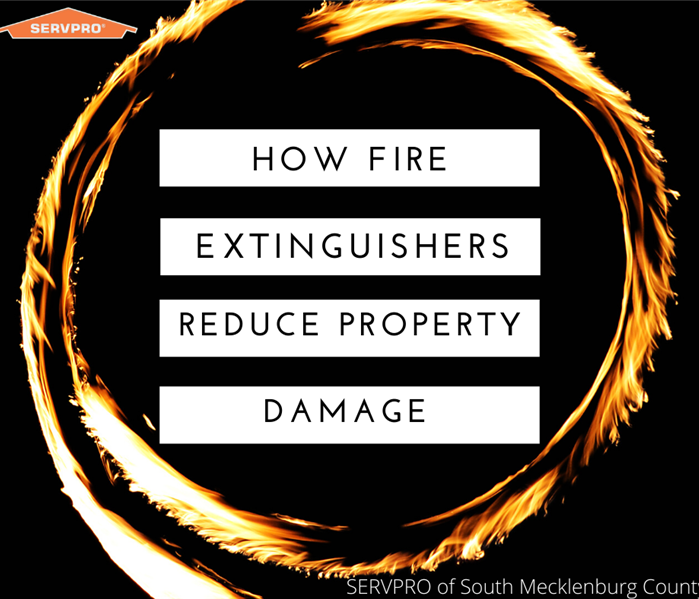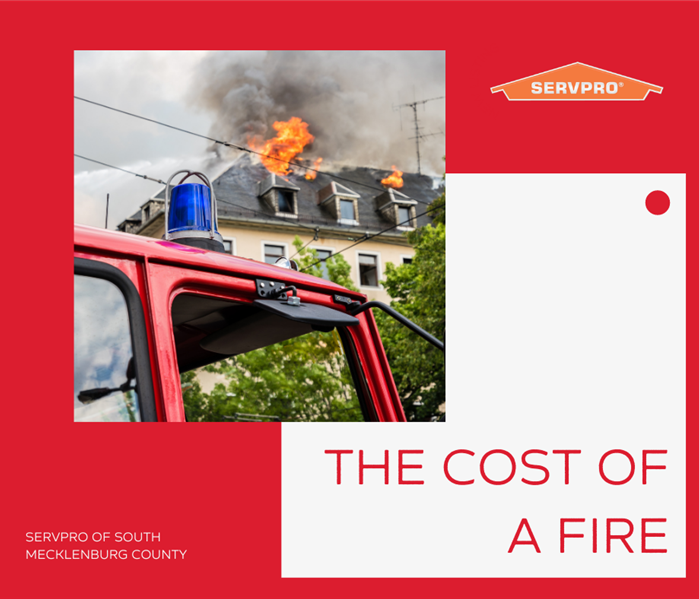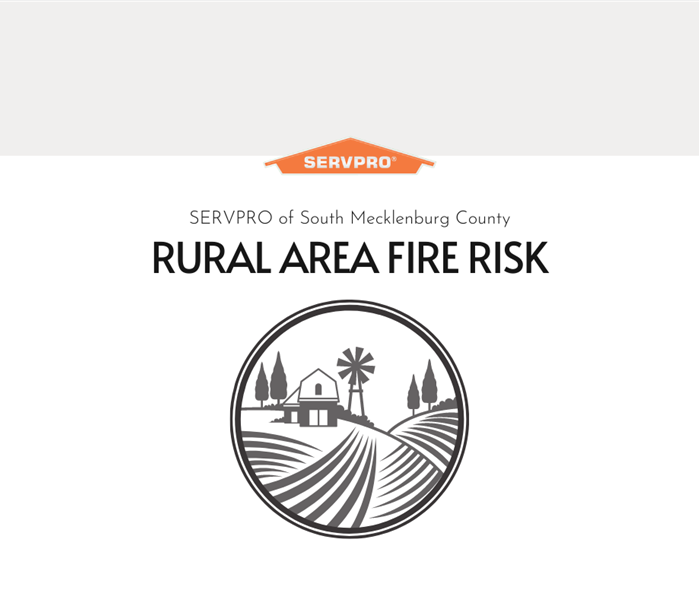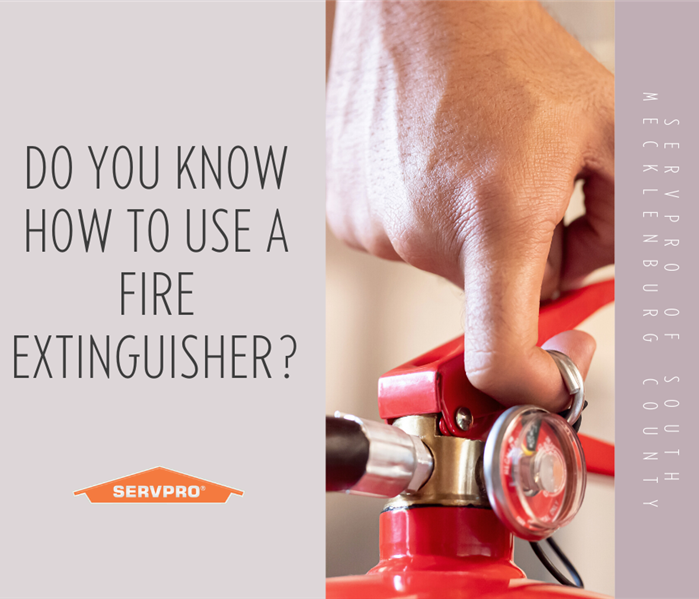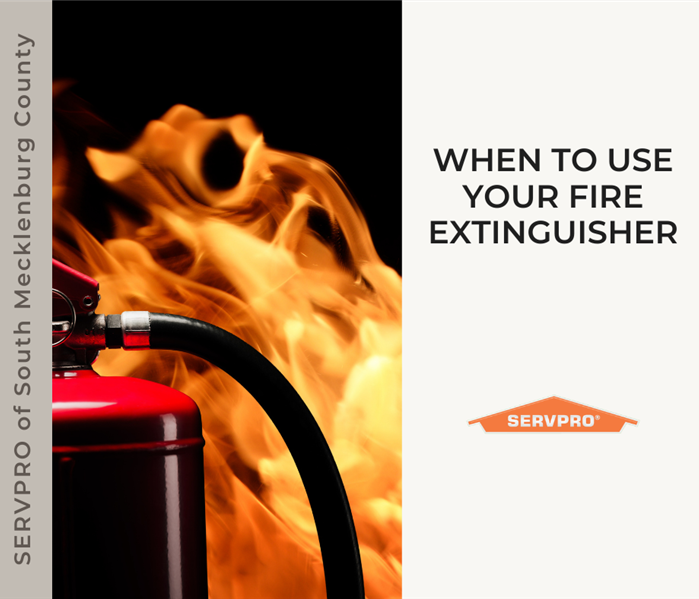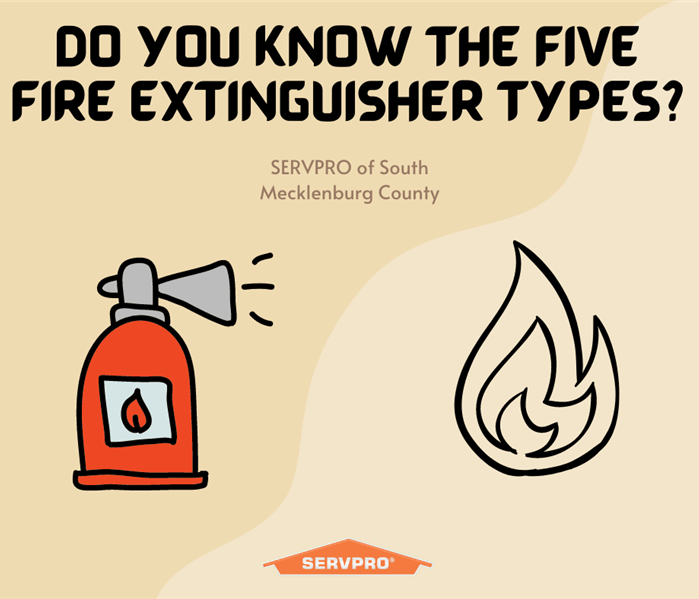Recent Fire Damage Posts
SERVPRO of South Mecklenburg County: Fire Safety Tips for Your Charlotte, NC Property
11/15/2024 (Permalink)
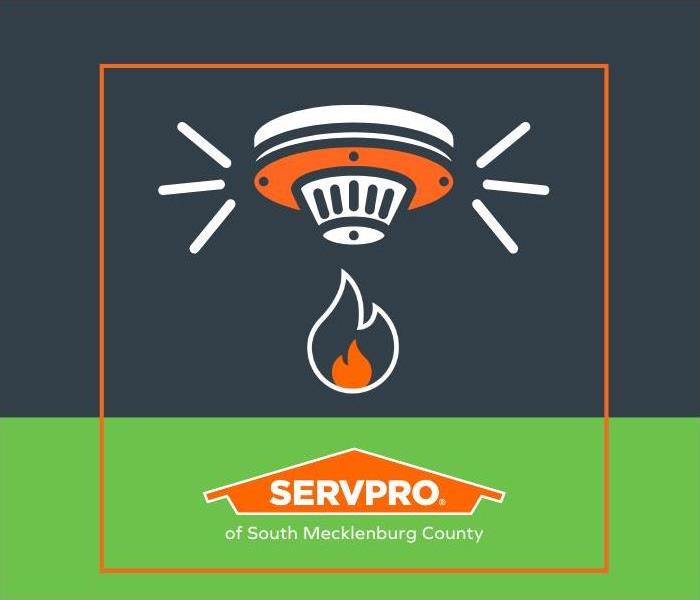 Smoke alarms save lives! Make sure they’re in the right spots to fully protect your Charlotte, NC property. Check out our latest fire safety tips!
Smoke alarms save lives! Make sure they’re in the right spots to fully protect your Charlotte, NC property. Check out our latest fire safety tips!
Keeping your Charlotte, NC home or business safe from fire damage starts with properly installed smoke alarms. Did you know that the placement of these alarms is just as crucial as having them?
Top Smoke Alarm Placement Tips to Protect Your Property:
- Bedrooms: Install a smoke detector in every bedroom for optimal safety.
- Living Spaces: Alarms should be placed in main gathering areas, like the living room, den, or family room.
- Stairways: Place alarms at the base of any staircases to catch rising smoke quickly.
- Kitchen Areas: Keep alarms at least 10 feet away from cooking appliances to avoid false alarms.
- Height & Draft Considerations: Never place smoke alarms more than one foot from the ceiling, and avoid areas near windows or drafty spaces.
- General Tips: Don't paint over alarms, as this can interfere with their effectiveness.
For more details on smoke alarm placement and testing, visit the National Fire Protection Association website.
If fire damage occurs at your Charlotte, NC home or business, SERVPRO of South Mecklenburg County is here 24/7 to restore your property and make it "Like it never even happened."
Stay Safe with SERVPRO of South Mecklenburg County!
What Are Soot Webs? | SERVPRO® of South Mecklenburg County
11/2/2023 (Permalink)
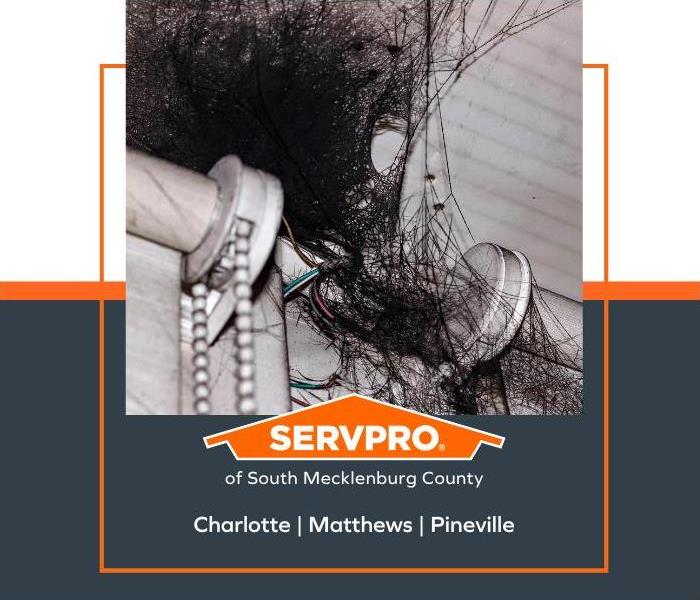 What are these black webs on my window shades?
What are these black webs on my window shades?
When you are in the Fire Restoration business, you see a lot of damage caused by fires. Sometimes, fire damage is hidden behind walls or in attic spaces, while other Charlotte, NC fires cause more visible damage. We’ve seen all levels of damage over the years, and one phenomenon that mystifies some of our customers is soot webs. Soot webs, also called soot tags, are nothing to fear.
What are soot tags?
While it might look like a gigantic “fire spider” has come into your home, we can assure you that is untrue. Soot tags have nothing to do with spiders and are caused by air circulation and soot.
Soot tags happen when petroleum or synthetic-based sources burn in areas with low circulation. When a fire burns in your Pineville, NC, home or business, the hot air will move to cooler areas to create an equilibrium. As the soot from these petroleum or synthetic sources rises, it travels with the air into colder areas with lower circulation. As the soot concentrates in these low-circulation areas, they can create long chains of soot. The long chains are created because the soot is charged from the combustion process, making it attract other similar particles.
While you might be worried that soot has coated an existing spider web or the elusive “fire spider” has been in your home, the reality is much simpler.
Have you had a fire emergency?
If your home or business in Matthews, NC, and the surrounding areas experience a fire emergency, be sure to call SERVPRO® of South Mecklenburg County. We are always Faster to Any Size Disaster to help restore your home or business to its original state.
If you have more questions about soot tags or other fire-related damages, please email us at admin@SERVPRO10981.com or call us at (704) 840-6112.
Find more fire-related information from the National Fire Protection Association, the Charlotte Fire Department, or the Pineville Fire Department.
How To Deal with Smoke Damage from Nearby Fires | SERVPRO® of South Mecklenburg County
6/8/2023 (Permalink)
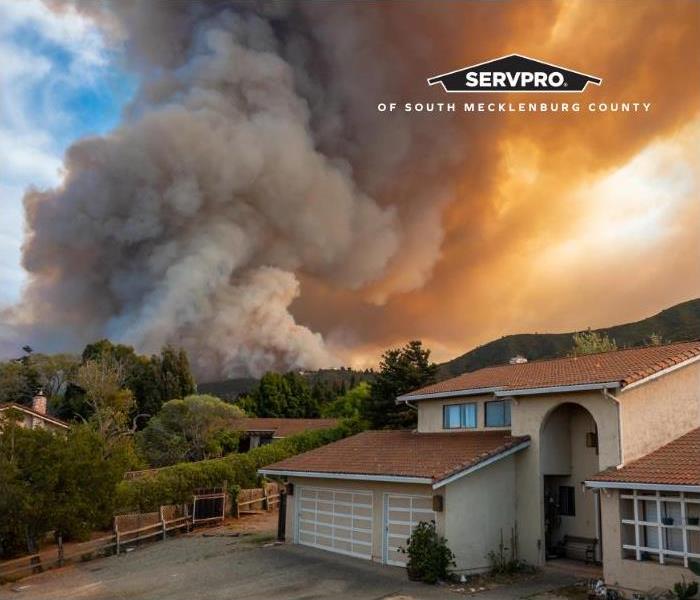 Can smoke spread from nearby fires into my home?
Can smoke spread from nearby fires into my home?
Even the smallest of fires can create large amounts of smoke damage, and that damage isn’t just confined to the area of the fire. Fires can spread smoke for miles, so even that little fire a few doors down could cause smoke damage in your home. If your home or business has suffered smoke damage because of a fire near you, there are some steps you can take.
- You should first speak with your insurance agent to discuss how damages will be covered. Smoke damage is often covered by most insurance policies, but be sure to check yours and improve your coverage if needed.
- Be sure to thoroughly document damages by noting the date of the fire, location, types of damages and losses, injuries, and description of damages. Make sure to include images of all damage as well.
- It is also important to understand that even though some items may not appear smoky, they may still need to be replaced. Electronics can make this especially difficult. Smoke can easily enter through the vents of electronics causing internal damage that may not be visible externally.
- After you have documented damages, turn the rest over to professionals. There are often dangers associated with cleaning soot and ash from items that professionals know how to deal with. Smoke can very easily spread throughout your home if you aren’t careful, and some items need specialized cleaning to remove tough soot stains. Your technicians will have the right gear to deal with these dangers and protect your belongings.
Many factors go into determining the extent of damage, and without the experience and knowledge that comes from professionals, certain damages may be overlooked. If you are unsure whether or not items can be saved, a fire restoration specialist can help you determine the extent of the damage. If you notice a fire near you, take steps to keep your family, friends, employees, and others safe first, then call the proper emergency authorities. When it has been determined safe for you to return to your property, call your insurance company and SERVPRO® of South Mecklenburg County to make it "Like it never even happened."
Fire Pit Safety Precautions
6/8/2022 (Permalink)
 Keep your family safe around the fire pit
Keep your family safe around the fire pit
Whether you’ve used your fire put hundreds of times or just installed a new one, learning about fire pit safety is always important. Keep your friends and family safe when you follow these helpful tips:
Select The Right Site
Fire pits should always be placed on level ground at least 10 to 20 feet away from any structure, or plants. Overhanging trees can easily catch fire when flying embers come into contact with leaves or bark. Trim back trees or find an open area for your fire pit. Some local laws may require a minimum distance from structures, so always check local Charlotte, NC, guidelines.
To prevent the fire from spreading on the ground, keep the area clear of sticks and other flammable debris. If your ground cover is currently something like mulch or pine straw, replace it with pebbles, sand, or brick.
Use Proper Fuel
If you have a wood burning fire pit using the proper fuel is essential to your safety. Always use dry, properly seasoned wood. Using woods that are not intended for fire pits can release toxic fumes or burn too quickly and create dangerous flames. Using soft wood or wood that hasn’t been dried properly can cause pops and crackles. When preparing the wood, always cut the pieces to less than three-quarters of the length of the fire pit, and never use a fire starter or gasoline to get the flames started.
Safe Seating
When choosing your seating for the fire pit area, opt for chairs that are secured to the ground, or heavier options that are more difficult to move. This prevents people from pulling the chairs too close to the fire. Avoid chairs with flammable materials like polyester camping chairs or flammable outdoor throw pillows. When shopping for furniture, search for non-flammable options that are designed for use near fire pits.
Fire Blanket & Extinguishers
In the unfortunate event the fire does spread from your fire pit, it is best to have the necessary safety equipment nearby. Having a fire blanket is essential if someone gets too close to the fire. A fire extinguisher should also be stored nearby, but be sure you have the right class fire extinguisher. Be sure you are using a class B or C extinguisher. Once you have the right class, be sure you and those around you know how to use a fire extinguisher properly.
If your fire pit resulted in a fire that spread to your home, SERVPRO of South Mecklenburg County is here to help. Call us at (704) 840-6112 anytime for all of your restoration needs.
CAN A CURLING IRON START A FIRE?
4/21/2022 (Permalink)
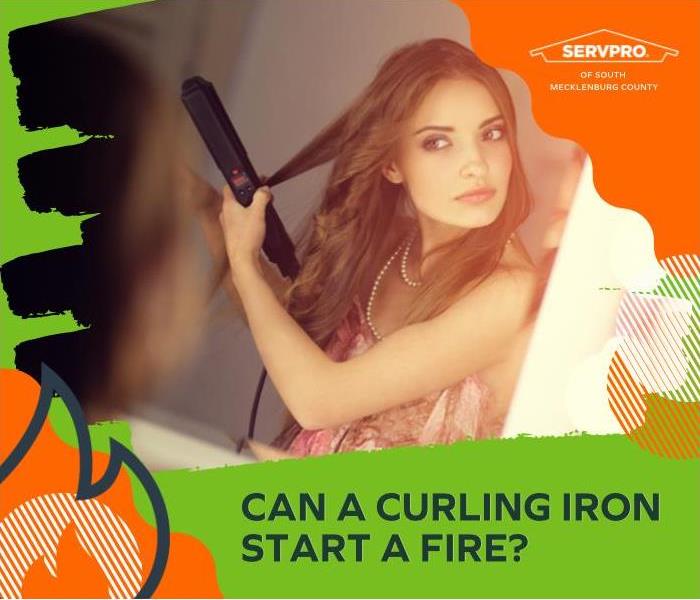 Are Curling Irons a Fire Hazard?
Are Curling Irons a Fire Hazard?
As innocent as it might seem, a curling iron can cause fire damage to your Charlotte, NC home if not properly used and stored.
Curling irons are heated by an electrical resistor, and if left on for too long, the iron’s circuit board could start a home electrical fire. Even curling irons with an automatic shut-off feature are at risk of starting fires. A report from the U.S. Consumer Protection Safety Commission (CPSC) states that personal grooming appliances, including curling irons, caused an estimated 234,000 fires.
Tips to Prevent a Curling Iron Fire:
- Don’t overload bathroom outlets
- When your hair is done, unplug the iron to avoid a fire or simply a burn to the surface it is placed on → make this a habit!
- Use the built-in rests that are usually on the iron’s grip so that it doesn’t lay on the countertop
- Buy a silicon mat if your curling iron does not have an attachment for it to rest on
To protect yourself and your family, always pay attention to where hair tools are, follow all safety instructions, and unplug any tools not in use.
Don’t worry, if your Charlotte, NC home experiences an electrical fire, SERVPRO of South Mecklenburg County is never more than a call away. Our highly trained technicians are experienced in fire damage restoration and can assure you that you’re in good hands.
Fireplace Safety Knowledge
2/22/2022 (Permalink)
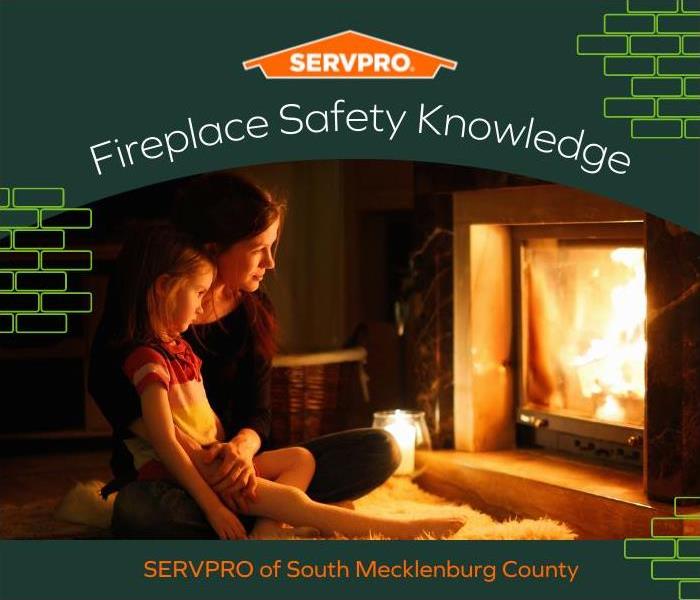 Fireplace Safety Knowledge
Fireplace Safety Knowledge
A cold winter’s night is a great time to enjoy a relaxing evening by the fire. It is also a good time to review your fireplace safety knowledge. SERVPRO of South Mecklenburg county wants you to be both cozy and safe! We have some tips to share to keep you that way!
- Creosote, a sticky flammable substance released by wood-burning, can build up in the chimney. If a chimney is not cleaned a creosote buildup in the chimney can catch on fire.
- Leaves and animal nests can also build up in chimneys during the off-season.
- A level one inspection will ensure a sturdy chimney and necessary cleaning for both gas and wood-burning chimneys.
Only burn dry, seasoned wood
- For the best fire, your wood should contain about 20% water. Fresh-cut wood can contain up to 45% making it hard to catch fire, produces more smoke and creosote builds up faster.
- You should avoid using other materials like paper, cardboard or foam. These items can cause extreme flames and smoke.
Check the damper
- A damper is a plate or valve that controls the airflow in your chimney. This is what keeps wind and rain out when the fireplace is not in use.
- Before starting a fire be sure to open the damper all the way to allow the fire to start and allow smoke to flow upwards. After the fire is strong the damper can be closed partially to keep heat in while letting smoke out.
Install carbon monoxide detectors
- Carbon monoxide is produced from burning wood which can build up indoors it can cause serious problems. Be sure to install a detector near the fireplace and in bedrooms to protect from carbon monoxide poisoning.
To see more fireplace safety tips in action check out this video.
Want to know more about SERVPRO of South Mecklenburg County? Please check out our other pages:
LinkedIn Facebook Instagram Twitter Angie's List BBB YouTube Pinterest Yelp
Smoke Damaged Books
2/7/2022 (Permalink)
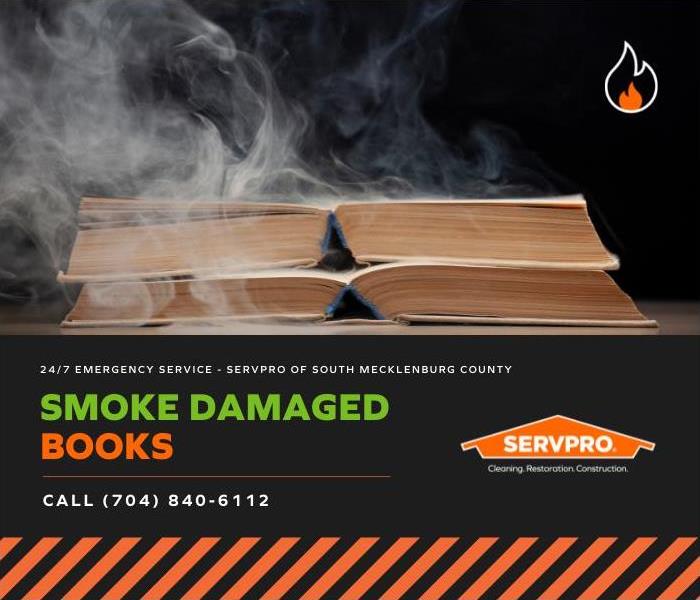 Smoke damaged book
Smoke damaged book
Smoke damaged books after a fire? Can they be saved? Yes, it is possible, with some time and care. If you decide to attempt to clean up the books yourself, we have supplied a list below to help you with the process:
Book Covers:
- In a small bowl mix warm water and a small amount of detergent.
- Slightly dampen a soft cloth or sponge.
- Being careful not to scrub, gently wipe soot from the book covers.
- Immediately wipe dry with a clean, dry, soft cloth.
- Allow the book cover to dry completely.
- The book cover may dull after being cleaned. If this happens, apply a very light layer of oil-based furniture polish.
Book Pages:
Cleaning book pages will depend on the level of damage. It is important to never introduce moisture to the pages as it will make the process more difficult.
- Slight damage: use a dry sponge to gently wipe off the soot.
- Moderate damage: use an art gum eraser to rub the edges of the pages. If this is not working, use a hard, rubber eraser.
- Persistent damage: use a clamp to hold the pages shut and use a piece of sandpaper to gently remove the smoke damage. Move slowly and evenly to avoid waves in the pages. Using a dry sponge wipe away any dust from the sanding.
Remove Smoke Odor:
- Fill a plate or bowl with either baking soda, fresh coffee grounds, activated charcoal, or white vinegar and place it in a box or bag. Place the books next to the plate or bowl and close the box or bag.
- Let it sit for several hours or overnight.
- Remove the odor absorber and if the smoke smell has not fully disappeared, repeat the process using a fresh odor absorber.
If you are feeling overwhelmed with the post fire clean up process contact us, SERVPRO of South Mecklenburg County is Here to Help®!
LinkedIn Facebook Instagram Twitter Angie's List BBB YouTube Pinterest Yelp
SERVPRO Preparedness: Have a Family Fire Escape Plan
2/6/2022 (Permalink)
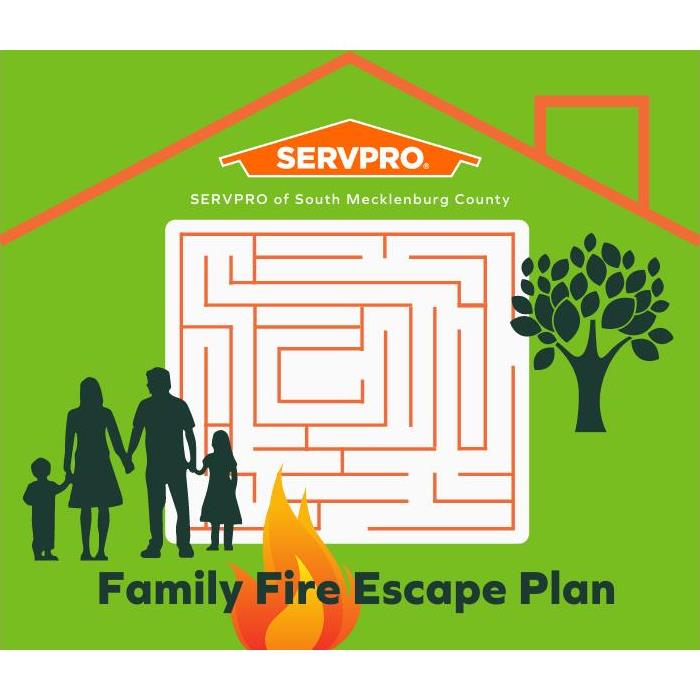 A maze representing a family home fire escape plan.
A maze representing a family home fire escape plan.
When dealing with a fire in your home, seconds count! Be prepared with a Family Fire Escape Plan to help maximize the short time you have to get your family out safely.
- Draw a map of your home showing all the doors and windows. Discuss the plan with everyone in your home.
- Know at least two ways out of every room.
- Pick an outside meeting place a safe distance from the home where all family members should meet. Examples: tree, light pole or mailbox
- Twice a year, practice your home fire drill at night and during the day with everyone in your home. Make sure to practice using different ways out as well as teaching children how to escape on their own in case you can not help them.
- Close doors behind you as you leave. This can help slow the spread of smoke and fire giving you more time to get out.
- If you hear your smoke alarm go off - GET OUT AND STAY OUT! Get as low as you can and go LOW if you have to escape through smoke. Never go back inside for people or pets.
We at SERVPRO of South Mecklenburg County want to help keep you safe. For further tips and tricks to help create your Family Fire Escape Plan visit The National Fire Protection Association.
Want to know more about us? Please call (704) 840-6112 or check out our other pages:
LinkedIn Facebook Instagram Twitter Angie's List BBB YouTube Pinterest Yelp
Holiday Hazards: After Christmas & The New Year
1/19/2022 (Permalink)
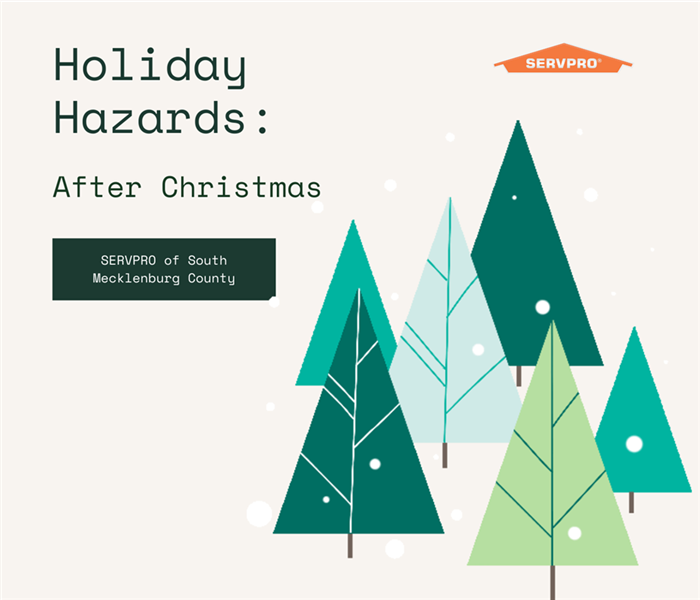 The dangers of Christmas trees after Christmas
The dangers of Christmas trees after Christmas
Most homeowners are aware holiday decorations should be used with care. We often hear of fires caused by Christmas lights, frayed wires, and candles during the holiday seasons, and try to take care when decorating. But the team at SERVPRO of South Mecklenburg County wants homeowners to know that the danger of fire caused by holiday decorating actually increases after Christmas. The 10 days with the highest average number of fires are all after Christmas day. So if you are slow to take down holiday decorations like we are, then be sure to ensure your decorations are safe.
Often after Christmas, it is tempting to relax and stop watering the tree. Dry greenery, open sockets, and decorations that have shifted closer to light sockets or fireplaces all dramatically increase the risk of fire.
The number one cause of holiday fires is Christmas trees, according to the American Christmas Tree Association. Trees dry out quickly, especially when they are not watered properly, and a dry try is especially flammable. Tragically, Christmas tree fires are particularly deadly, claiming an average of one life for every 40 fires, compared to one death for every 142 home fires from other causes.
Because of the dangers live trees pose, SERVPRO of South Mecklenburg County recommends opting for a faux tree. If you choose to stick with a real tree, please use extreme caution when decorating with a live tree. Make sure to water your tree from the minute it goes up to right when you take it down. Our team also recommends keeping your tree away from fireplaces, candles, or open light sockets. Before putting any lights on the tree inspect the wires for any fraying and consider upgrading to LED lights that put out less heat. It is important to remember that a Christmas tree fire, like any other fire, can result in very extensive smoke damage and are very deadly.
If a Christmas tree fire does start in your home, your first priority should be getting out of the building. Due to increased danger from this type of fire, there is no time to grab precious belongings.
As we get closer to Christmas, SERVPRO of South Mecklenburg County reminds Charlotte, NC, homeowners to take precautions to prevent holiday traditions from turning into a nightmare.
If you have experienced the misfortune of a Christmas tree fire, after the Charlotte, NC, fire department has arrived be sure to call SERVPRO of South Mecklenburg County to make it "Like it never even happened."
Want to know more about us? Please check out our other pages:
LinkedIn Facebook Instagram Twitter Angie's List BBB Youtube Pinterest Yelp
How Much Damage Does A Fire Hose Cause?
1/6/2022 (Permalink)
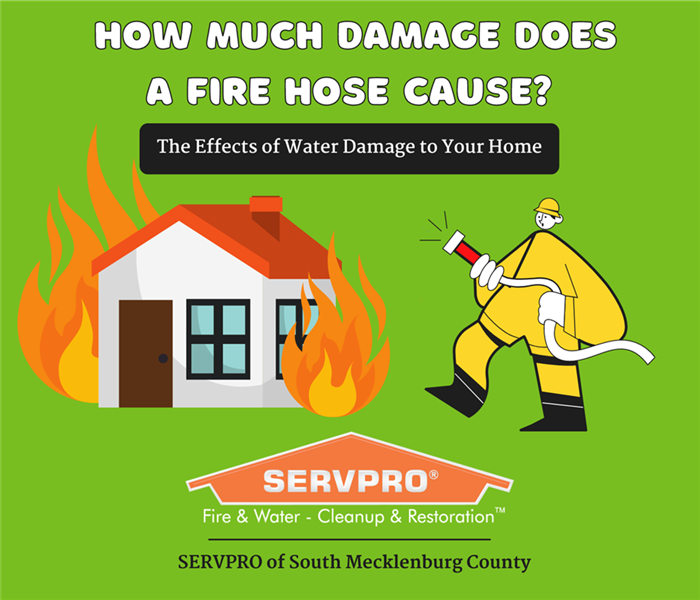 The Importance of Recognizing Water Damage to Your Home
The Importance of Recognizing Water Damage to Your Home
When a fire breaks out on your property, there’s no question that it has the ability to cause a wide range of damage. Fires cause significant damage on their own, and when they are extinguished, the water used to put it out can have an even more devastating effect on your property and belongings. Fire hoses, in particular, can be harsh on your home due to the amount of power and pressure they provide. Fire hoses can bring as much as 500 gallons of water per minute into your home. Because of this, hoses tend to cause more damage than a standard sprinkler system would. This can eventually lead to other forms of secondary damage that cause even more destruction to your home over time.
Mold
With such water damage, there is potential for mold growth. In fact, mold spores can flourish in your home within 24 hours. The mold will eat away at materials such as drywall, wood and floorboards, weakening the overall structure in your home. Since mold can produce allergens and irritants, and affect the structural integrity of your home, you should call SERVPRO of South Mecklenburg County to inspect your Charlotte home the minute you see water, to help prevent a mold problem, or to keep it from getting worse. If any mold is found, we have the training, equipment, and expertise to remediate your mold infestation.
Electricity
Another negative side effect from water damage is its impact on your home’s electrical systems. Once they are damaged by water, wiring, outlets and electrical boxes are extremely unsafe to use unless they are inspected professionally. This type of damage normally occurs to washing machines, kitchen appliances, furnaces, hot water tanks, dryers, and low mounted electrical outlets. Always remember, once an electrical item has touched water, it is extremely dangerous, so turn off electricity to the area if possible, and never enter water when the power is still on.
Bugs
Moreover, bug infestations are also known as one of the worst effects of water damage in your home. Because bugs love moisture and water damaged areas, it creates a perfect breeding ground for insects such as mosquitoes, beetles, fleas, ticks, spiders. Additionally, the hatching eggs and dying bugs can attract other insects to the affected area.
As you can see, when your home is affected by water damage, it is imperative to take immediate action. Here at SERVPRO of South Mecklenburg County, we are able to chase the water and dry it before there is secondary damage to your home. We are strategically positioned to be "faster to any size disaster," so Pineville residents can expect a speedy response, regardless of what time of the day it is.
As the cornerstone of our business, SERVPRO’s extensive water damage restoration drying process emphasizes regular monitoring and documentation of the drying process from beginning to end, ensuring that your home is ”Like it never even happened.”
Every water damage situation is different and because of this we tailor the drying process to your needs. However, the general process typically remains the same. These steps below follow our normal water damage repair procedure.
Step 1: Emergency Contact
Step 2: Inspection and Damage Assessment
Step 3: Water Removal/Water Extraction
Step 4: Drying and Dehumidification
Step 5: Cleaning and Repair
Step 6: Restoration
Want to know more about us? Please check out our other pages:
LinkedIn Facebook Instagram Twitter Angie's List BBB Youtube Pinterest Yelp
How Smoke Continues to Damage Your Home After a Fire
12/30/2021 (Permalink)
 How Smoke Damage can Affect Your Home
How Smoke Damage can Affect Your Home
Every situation that involves smoke and fire damage can be different and SERVPRO of South Mecklenburg County is here to create a unique solution tailored for these specific conditions. We have helped many of our Charlotte friends and neighbors deal with the aftermath of a fire. We understand that it is devastating and heartbreaking to see your home damaged. Although certain memories can be lost when your home/business has been damaged, we can help make it "Like it never even happened."
Just because your house fire has been put out, it doesn’t mean that all the damage to your home is done. When different materials burn, the soot they create differs greatly and requires specific cleaning procedures. In fact, a large amount of fire damage is caused by smoke residue and if not taken care of properly, it can worsen over time.
Smoke often affects certain areas/rooms in your home that didn’t even touch flames. This is especially common when it comes to wildfires. When most people hear the word “wildfire” the American west, most likely California, is usually the first thing that comes to mind. However, North Carolina gets its fair share of wildfires. In fact, there has been an average of about 4,000 fires burning more than 115,000 acres annually since 1928. Because of this, it is important to be aware of the dangers that smoke damage can cause.
Although smoke carries high temperatures with it, this is not the main cause of fire damage. Its acidic contents, between the heat and the corrosive properties, is one of the biggest obstacles in repairing your home following a fire. One of its main effects is on the metal within your home or business. Depending on the kind of smoke and metal, this effect can range from slight tarnishing to complete corrosion. From smaller items like doorknobs to structural elements such as the pipes and beams in your home, smoke can cause some serious damage. Moreover, corroded pipes can create leaks, causing water damage on top of everything else you have to deal with.
Excessive smoke can create soot, a powder-like or greasy substance made mostly from carbon, which is another frequent byproduct of fires. It is especially detrimental to fabric items and furniture. Additionally, your walls and floors can sustain visible and invisible damage, like black walls and lingering smells.
The acidic properties of soot can further damage your home and indoor air quality if it is not removed and cleaned immediately. You should wash as much porous material as you possibly can. Cleaning porous flooring like tile, marble, and wood is critical because damage to these materials can eventually become irreversible. Within hours, metal starts to corrode.
Here at SERVPRO, we use specialized equipment and techniques to remove smoke and soot from ceilings, walls, and other surfaces. If you have to deal with any sort of fire damage to your home, do not worry-- we will be there to help make a plan, save as many of your items as possible, and clean your structure so that it is ready for life to return to normal as quickly as possible.
Want to know more about us? Please check out our other pages:
LinkedIn Facebook Instagram Twitter Angie's List BBB Youtube Pinterest Yelp
Decorate Your Home Safely
12/1/2021 (Permalink)
 SERVPRO Wants to Let You Know to Look Out for these Holiday Hazards
SERVPRO Wants to Let You Know to Look Out for these Holiday Hazards
It is the 2021 holiday season, and SERVPRO of South Mecklenburg County wants homeowners to stay safe as they decorate their homes for these upcoming festivities. Christmas, New Year’s Eve and New Years Day are some of the top three days for home candle fires. In fact, around 47,000 fires occur during the winter holidays claiming more than 500 lives, causing more than 2,200 injuries, and costing $554 million in property damage.
Research shows that around 30 years ago, you had about 15-17 minutes to escape a house fire. Nowadays, that number has dipped to 3 to 4 minutes. Home fires are known to move faster today. It is believed that the two main culprits are cheap, modern furniture and synthetic fabric coverings. Additionally, as open floor plans become more common in modern homes it allows for easier oxygen flow and less barriers are set in place to stop a fire.
There are several contributors that are the cause for there being more house fires during the winter season. Heating is the second-leading cause of home fires, deaths and injuries. Because temperatures tend to dip below 40 degrees during the month of December here in Charlotte, NC, heaters are essential to homes. Space heaters especially contribute to this number. Another leading cause of home fires is the use of candles. More than 1/3 of home decorations are started by candles and around twelve percent of December candle fires began with decorations. Lastly, having a heat source that is too close to a Christmas tree is the cause of one in four winter fires, and around 52% of these fires result in deaths.
During the upcoming holiday season it is now, more than ever, important to have a safety checklist in your Charlotte home. If you haven’t done a fire safety check in your home, now is the time!
Use battery-operated candles. If you must use normal candles, make sure they are never left unattended, keep them away from anything that is flammable and put them out of reach from children and/or pets.
Make sure your holiday lights are not frayed or broken. Read the manufacturer’s instructions for the number of light strands to connect. Stringing too many lights together or using extension cords can lead to fires.
Keep your Christmas tree at least three feet away from any sort of heat source such as fire places, space heaters or candles.
If you are hanging stockings on your fireplace mantel, make sure to take them down when making a fire. They are highly flammable.
Make sure all of the smoke alarms in your house are working. They should be placed in every sleeping area, outside every sleeping area and on each floor of your home.
Before using a ladder to hang lights, indoors or out, make sure you get someone to spot you. The last thing you want to do is end up in the ER during the holidays.
Keep small decorative pieces away from kids and pets. Many holiday decorations have smaller pieces that can fall or break off so it is important to monitor your home for items that could be ingested or cause choking.
Any sort of injury or house fire can take the joy out of celebrating the holidays, so it is important to take appropriate precautions to ensure the safety of your home and your guests. No matter what holidays you celebrate, consider these steps for staying safe during your holiday festivities.
If a fire occurs in your home over the holidays our expert team is here to help. We are dedicated to serving our South Mecklenburg county locals in need. With specialized equipment and cleaning techniques, our “restore first” mentality reduces any interruptions and gets you back to your normal life.
Have Questions about Fire, Smoke, or Soot Damage?
Call Us Today – (704) 840-6112
Want to know more about us? Please check out our other pages:
LinkedIn Facebook Instagram Twitter Angie's List BBB Youtube Pinterest Yelp
Holiday Hazards: Safety Tips For Frying A Thanksgiving Turkey
11/23/2021 (Permalink)
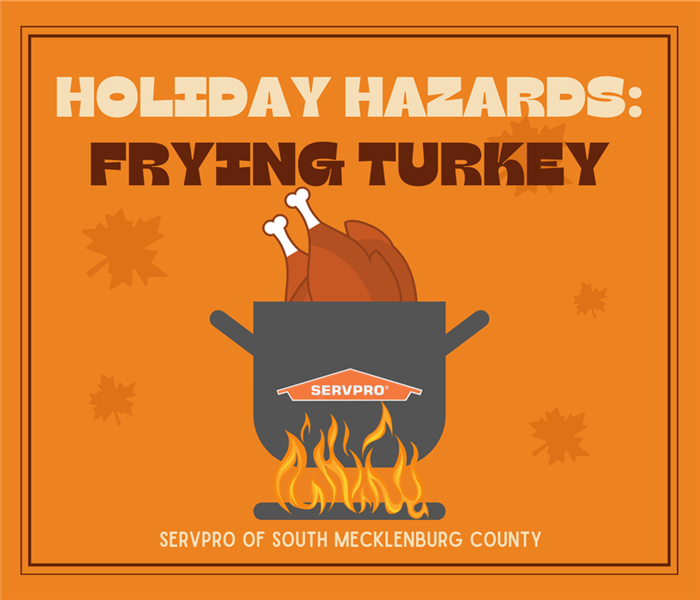 How to safely fry a turkey
How to safely fry a turkey
As we begin to prepare for the Thanksgiving season it is important to take safety measures when cooking your bird, and frying a turkey requires a few extra safety precautions. When using a consumer-grade turkey fryer there is a large quantity of oil at high temperatures, posing a risk for fire.
One big danger to consider is to make sure the turkey is completely thawed. If the turkey is not completely thawed out and dry it will ignite when it hits the oil. When the ice hits oil it will cause the oil to spill over and catch fire, or even an explosion hazard.
If you choose to fry your turkey make sure to put the fryer in an open area on flat concrete. Never use the fryer on wood surfaces or in a garage, or near flammable objects.
Never leave the fryer unattended as most units do not have temperature control and will continue heating until the oil catches fire.
Never allow children to go near the fryer and make sure to keep all pets restrained and away from the area.
Never overfill the fryer, make sure to leave enough room for the turkey to fit into the fryer without causing oil to spill over.
Cooking fires are very common on Thanksgiving, so make sure to take precautions to prevent a fire in your home, whether you are frying or baking your turkey. Even the stove or oven can start fires in a matter of seconds, so be sure you have the proper tools to deal with a kitchen fire.
If a fire does occur in your Charlotte, NC, home, make sure to call SERVPRO of South Mecklenburg County.
For more information on frying turkeys, and what to do in an emergency check out the National Park Services website.
Want to know more about us? Please check out our other pages:
LinkedIn Facebook Instagram Twitter Angie's List BBB Youtube Pinterest Yelp
Are You Cleaning Dryer Lint Properly
11/19/2021 (Permalink)
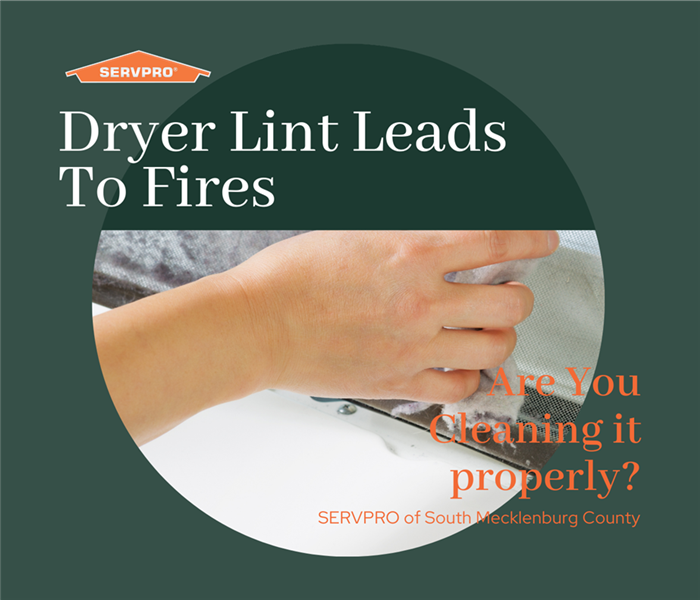 How to clean a dryer vent
How to clean a dryer vent
Did you know that your dryer can cause a home lint fire? According to the United States Fire Administration, there are about 2,900 clothes dryer fires reported each year. The USFA also states that almost 35% of those fired could have been prevented if the dryer had been cleaned. Ensure that your Charlotte, NC, home doesn’t suffer the devastating effects of a fire by cleaning your dryer regularly. Here are three steps to follow to avoid needing to call a fire restoration company.
Clean the screen
The first step to preventing lint fires is to clean the lint screen every time you use your dryer. Every dryer has a lint screen located on top or inside of the door. There are three ways to remove lint from the screen: run fingers gently across the screen, wipe a used dryer sheet across the screen or use a vacuum brush attachment. If you use dryer sheets we also recommend washing your screen with water every month to remove any residue.
Deep clean the vents
In addition to cleaning the screen, it is necessary to deep-clean the vents at least once a year. Lint can get trapped and accumulate inside the vent. This leads to inefficient and longer drying times on top of the added risk of combustion. Fortunately cleaning dryer vents isn’t difficult.
- Start by unplugging the dryer’s power supply
- Find the vent and disconnect it from the back of the dryer
- Use a vacuum and extensions to clean inside the dryer vent
- Head outside and remove the exterior vent cover and vacuum inside the vent
- If your vacuum extensions weren’t long enough find a dryer vent cleaning kit with flexible brushes to help clean the entirety of the vent
- Reconnect the vent to the back of the dryer and plug the power supply back in
Clean the exterior and interior
Cleaning the outside and inside of the appliance prevents dryer fires. Remove the back panel off of your dryer and gently wipe surfaces with a soft cloth. Check inside as well to remove any lint in the drum.
If you follow all these steps and still have the misfortune of a lint fire be sure to call SERVPRO of South Mecklenburg County at (704) 840-6112 to get your Charlotte, NC, home back to normal.
Want to know more about us? Please check out our other pages:
LinkedIn Facebook Instagram Twitter Angie's List BBB Youtube Pinterest Yelp
Smoke Damage From Adjacent Businesses
11/16/2021 (Permalink)
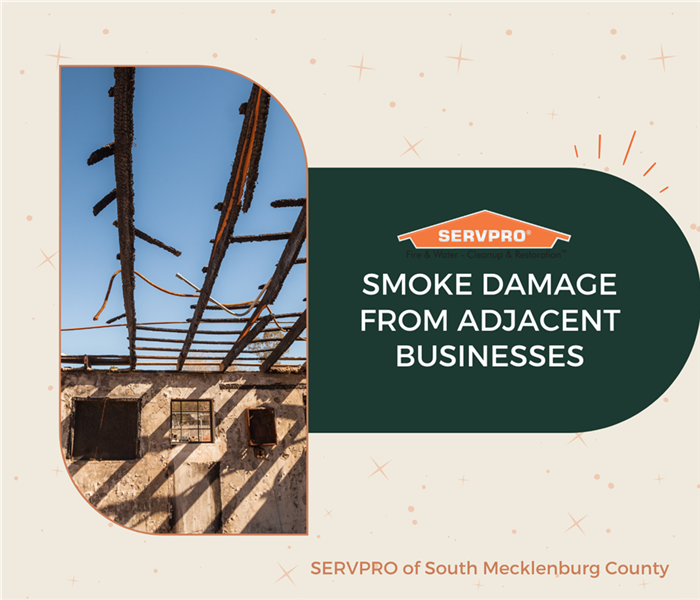 Can smoke spread from nearby fires?
Can smoke spread from nearby fires?
Even the smallest of fires can create large amounts of smoke damage in Charlotte, NC, and that damage isn’t just confined to the area of the fire. Smoke is a very light substance that can spread quickly and very far. If your home or business has suffered smoke damage because of a fire near your Pineville, NC, business there are some steps you can take.
You should first speak with your insurance agent to discuss how damages will be covered. Smoke damage is often covered by most insurance policies, but be sure to check yours and improve your coverage if needed.
Be sure to thoroughly document damages by noting the date of the fire, types of damages and losses, injuries, and description of damages. Make sure to include images of all damage as well. It is also important to understand that even though some items may not appear smoky they may still need to be replaced.
Something that might not be visibly damages is electronics. They may appear clean and to be working just fine, but smoke can be sitting inside of electronics, causing damage over time. Be sure to have all electronics taken apart and cleaned professionally before using them again after smoke has been in the area.
After you have documented damages, turn the rest over to professionals. There are often dangers associated with cleaning soot and ash from items that professionals know how to deal with. Using the wrong cleaning products could lead to soot stains that cannot be removed. Your technicians will have the right gear to deal with these dangers and protect your belongings.
There are many factors that go into determining the extent of damage and without the experience and knowledge that comes from professionals it is possible certain damages will be overlooked.
If you notice a fire near you, take steps to keep your family, friends, employees and others safe first, then call the proper emergency authorities. When it has been determined safe for you to return to your property, call your insurance company and SERVPRO of South Mecklenburg County to clean up and restore your property.
Want to know more about us? Please check out our other pages:
LinkedIn Facebook Instagram Twitter Angie's List BBB Youtube Pinterest Yelp
Clean Dryer Vents To Prevent Fire
11/13/2021 (Permalink)
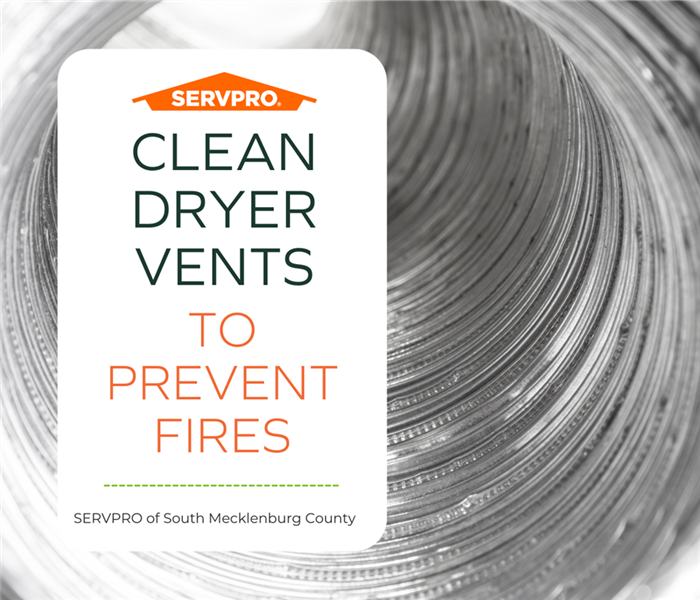 How dryer lint leads to house fires.
How dryer lint leads to house fires.
Fires in your Charlotte, NC, home can happen for a number of reasons, and one cause you may not consider is your dryer vent. A lint fire can spread quickly and create a large blaze, causing serious damage to your property. In fact, FEMA estimates $35 million in property damage each year. You can reduce the risk of serious damage to your property by learning how and when to clean your dryer vent and practicing dryer safety. Prevent calling the Charlotte Fire Department by following these tips:
Clean The Lint Trap Before Each Use
Lint builds up quickly, and not properly cleaning the lint trap is the leading cause of home dryer fires. You can prevent one of the 2,900 annually reported dryer fires from occurring in your home when you clean the lint trap before each use of the dryer.
Clean the Vent Bi-Annually
Cleaning the lint trap isn’t enough to stop dryer fires. Cleaning your dryer vent out twice a year can clear out the lint buildup that makes it past the lint trap. The lint that builds up in the vents can cause a serious fire. Consider making this task a regular item on your spring and fall cleaning list so you do not forget. Keep in mind, the highest number of dryer fires occur in the winter, primarily in January, so be sure dryer vents are clean before the dry weather helps spark a fire.
Clean Each Part Thoroughly
A lint fire can start when the heat from the dryer causes trapped lint to ignite. Lint often builds up in the trap, hose, and vent ducks, so be sure to clean each part thoroughly. A vacuum is a very helpful tool for removing excess lint from the dryer system. Start with the lint trap, then unplug the dryer and vacuum all around the hose before disconnecting the hose. Disconnect the hose and shake out the trapped lint and clean out the duct. Plug the machine back in and vacuum any remaining debris that could cause a fire.
Have Your Dryer Area Inspected
Calling a professional fire inspector to ensure your dryer space is properly protected may reduce the chance of a fire. Whether your laundry room is inside your home or in a semi-detached space, professional inspectors can help you understand whether the space is safe and how you can best prevent fires.
You can prevent a lint fire at your Charlotte, NC, home with proper dryer maintenance and cleaning. You can teach your family these tips as well so they can help keep your home safe from sudden fires.
If a fire does occur in your Pineville, NC, home, calling a professional fire restoration company is the only way to make it "Like it never even happened."® Day or night SERVPRO of South Mecklenburg County is here for you, just give us a call at (704) 840-6112.
Want to know more about us? Please check out our other pages:
LinkedIn Facebook Instagram Twitter Angie's List BBB Youtube Pinterest Yelp
How To Keep Pets Safe From House Fires
11/8/2021 (Permalink)
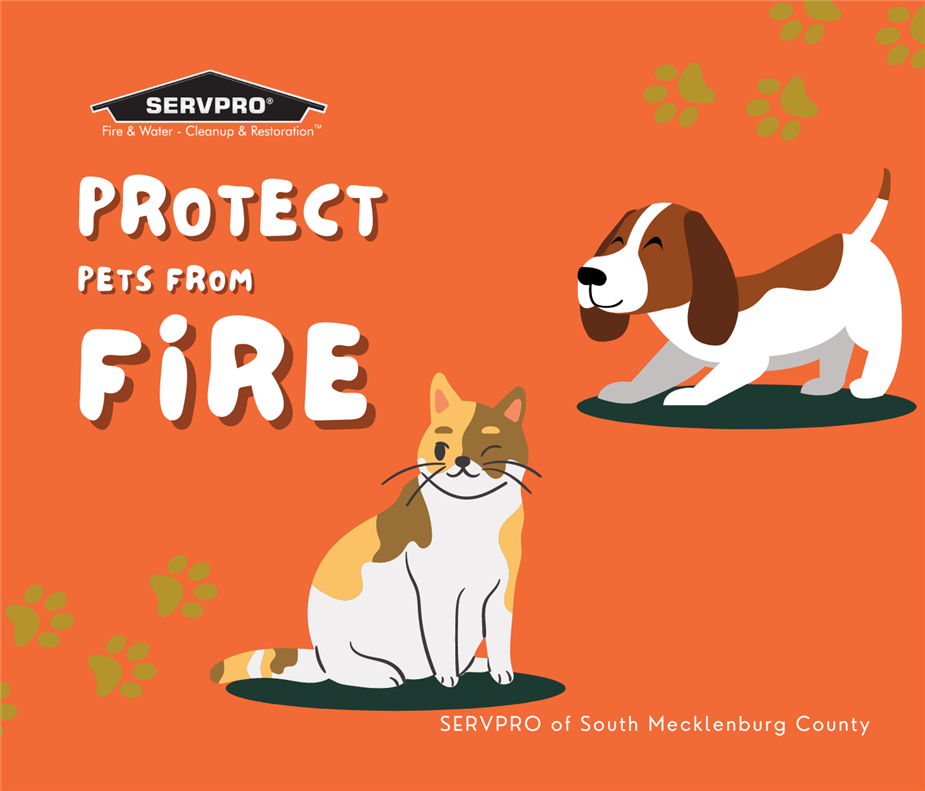 How to keep pets safe during a fire
How to keep pets safe during a fire
The American Kennel Club shared some great tips to keep our fur babies safe from a home/business fire. Molly, our very own SERVPRO of South Mecklenburg County dog, comes with us to work almost every day! When I read these tips, I knew I wanted to share them with you so you can keep your pets safe too.
Tips to Keep Pets Safe from House Fires:
- Extinguish Open Flames – Pets are generally curious and will investigate cooking appliances, candles, or even a fire in your fireplace. Ensure your pet is not left unattended around an open flame and make sure to thoroughly extinguish any open flame before leaving your home.
- Pet Proof the Home – Take a walk around your home and look for areas where pets might start fires inadvertently, such as stove knobs, loose wires, and other potential hazards.
- Secure Young Pets – Especially with young puppies, keep them confined away from potential fire-starting hazards when you are away from home.
- Keep Pets Near Entrances – When leaving pets home alone, keep them in areas or rooms near entrances where firefighters can easily find them.
- Practicing Escape Routes with Pets – Keep collars and leashes at the ready in case you have to evacuate quickly with your pet or firefighters need to rescue your pet.
- Since Pets Left Alone Can’t Escape a Burning Home – Use monitored smoke detectors that are connected to a monitoring center, providing an added layer of protection beyond battery-operated smoke alarms.
- Affix a Pet Alert Window Cling – Write down the number of pets inside your house and attach the static cling to a front window. This critical information saves rescuers time when locating your pets. You can obtain a free window cling by going to the American Kennel Club website.
- Keep Your Information Updated – Firefighters are familiar with pet alert window clings so keep the number of pets listed on them updated. Knowing the accurate number of pets in the house aids rescuers in finding all of your pets.
Keeping your pets safe should be a top priority, so don’t delay when getting your window cling, and practicing emergency routes. As always, SERVPRO of South Mecklenburg County is proud to be your local fire restoration specialist, so give us a call if you ever experience a fire in your home.
Want to know more about us? Please check out our other pages:
LinkedIn Facebook Instagram Twitter Angie's List BBB Youtube Pinterest Yelp
Wildfire Safety
11/5/2021 (Permalink)
 What to do after a fire
What to do after a fire
Those beautiful falling leaves, crisp, dry days, and blustery winds, and campfires with smores make fall spectacular in the Carolinas, but they can also lead to wildfires. Do you know what to do if there is a wildfire near you or your property?
Most wildfires are caused either by human actions or lightning. You can easily prevent these disasters from happening if you:
- Fully extinguish your campfires and be sure you always practice proper firepit safety.
- Clear leaves and debris from your gutters, eaves, porches, and decks.
- Remove dead vegetation from around your home and property.
- Cover exterior attic vents with 1/8 inch or less mesh
- Inspect and repair the roof- missing shingles can allow embers to catch
- Keep your grass cut short
- Safely burn your debris- keep the fire small, keep water available and close, and don't burn on windy days or when there is an advisory.
- Carefully put out smoking materials properly.
Prepare BEFORE-
- Know where to go if you are evacuated- don't forget your pets!
- Make an emergency plan and share it with your loved ones.
- Have multiple routes in case one is blocked but check and make sure they are open when evacuating. Using technology is a great way to ensure your intended route is open during an emergency.
- If you are building a new home or business, consider using flame-resistant materials.
- Put together and update your emergency kit.
- Teach children proper fire safety so they know what to do in an emergency.
- Ensure anyone with disabilities is included in your fire safety plan.
- Have the right fire extinguisher, keep it maintained, and know when to use it.
- Have proper fire safety equipment in your home, like smoke detectors.
There is a wildfire...now what?
- Follow your emergency plan.
- Immediately evacuate when instructed.
- Take your emergency ready kit with you
- Follow the instructions from local officials
- Return when conditions are safe and you have been given the all-clear from the officials.
If smoke is impacting your area:
- Keep your doors and windows closed.
- Keep your air conditioner intakes closed.
- Keep your air filters clean.
- Evacuate if ordered, or it is uncomfortable to remain indoors.
If the fire has impacted your home:
If you have fire, water, or smoke damage, please call SERVPRO of South Mecklenburg County at 704-840-6112. We will be there to help you make it "Like it never even happened."
Most Common Causes of Fires
10/21/2021 (Permalink)
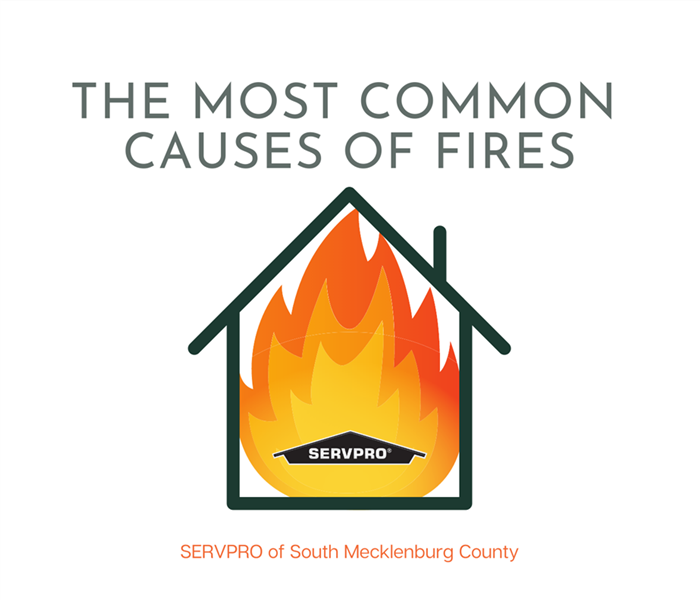 How To Prevent Home Fires
How To Prevent Home Fires
A fire can be devastating to everyone involved, check out the most common causes that you can help prevent in your home:
- Smoking indoors: many people smoke in their homes, which is dangerous and can be damaging to the home's structure. A fire can be started from falling ash from a lit cigarette in an instant.
- Unmaintained dryer vents: lint can accumulate very quickly, and one small spark can start a fire. Cleaning dryer vents either before or after every load is a quick and easy way to prevent a fire in your home. A thorough cleaning of full vent system should be completed yearly to maintain a proper working dryer and to prevent fire.
- Faulty electrical equipment: if you see a wire on any electrical equipment that appears frayed or damaged in any way, make sure you replace it immediately. Exposed wires are extremely dangerous, so don’t waste time fixing any damaged wires.
- Overloaded outlets: plugging too many things into one outlet, extension cord, or power strip can be hazardous. Be sure to never plug multiple extension cords or power strips onto one another.
- Candles: candles should always be used under supervision and should be put out when you leave the home. Always make sure they are on a level surface and not near any flammable surfaces. Check out our post on candle alternatives to make your home safer.
- Space heaters: space heaters have the potential to be very dangerous. The units can become very hot and cause items nearby to catch fire. Make sure you are following the proper instructions on your unit and keep flammable items far away.
- Cooking: keeping a fire extinguisher in your kitchen is very important. Many things can go wrong, especially with open flame gas cooktops, so having the proper fire safety equipment is essential to reducing damage.
A fire in your home could be devastating, so preparing yourself, your family, and your pets can be the difference between life and death. To learn more about fire safety read our other blogs, and be sure to always follow the advice of the Charlotte Fire Department and the Pineville Fire Department.
Want to know more about us? Please check out our other pages:
LinkedIn Facebook Instagram Twitter Angie's List BBB Youtube Pinterest Yelp
Safe Candle Alternatives
10/19/2021 (Permalink)
 How To Prevent Home Fires
How To Prevent Home Fires
Candles can become danerous in an instant, but people often take the risk of starting a fire to experience the lovely aroma and ambiance of candles. To keep your home safe without giving up the perks of lighting your favorite candle, keep reading about all of our candle alternatives.
1. Ultrasonic Essential Oil Diffuser
With self-care becoming more and more mainstream, it should come as no surprise that many people are using popular spa treatments in their homes. Case in point: ultrasonic aromatherapy diffusers.
Utilizing the invigorating powers of natural essential oils, ultrasonic diffusers — such as the AromaOm Ultrasonic Diffuser — are essentially small humidifiers that emit cool, aromatic mist. Not only do they fill a room with aromatherapy scents, but (unlike candles) they’re safe to leave unattended, too. And unlike the humidifiers they share technology with, they won’t significantly raise the humidity of your home.
2. Diffuser Sticks
Looking for a diffuser that lasts a bit longer? Consider a vase filled with diffuser sticks. This type of room scent not only makes for an excellent home accessory, but it also works well and isn’t too overpowering. Plus, the oil blend lasts a lot longer than an ultrasonic diffuser, so you can reap the benefits of natural scents without much fuss. Even better? These diffuser kits are easy to find at stores like Target and Walmart.
3. Electric Wax Warmer
With electric wax warmers, you can have your cake and eat it, too. Like candles, wax warmers utilize scented wax to fill a space with invigorating scents. Only, they’re much safer than candlewick, as they don’t utilize an open flame to melt the wax. Wax melts come in thousands of scents, so you won’t be missing out by switching to this safer alternative.
4. Potpourri
With so many different options for room aromas, potpourri isn’t as popular as it once was. However, it still gets the job done and can look beautiful in an entryway or on a coffee table. Look for handmade potpourri on Etsy, or make your own to get the perfect scent for your home.
5. Slow Cooker Potpourri
In addition to traditional dry potpourri, slow cooker potpourri is another great way to add some festive scents to your home, and it’s much safer than using the stove. All you have to do is add some of your favorite aromas like cinnamon sticks, cranberries, apples, etc. — to a crockpot, fill it with water, and turn it on low. With time, the ingredients will begin to simmer and give off a warm, inviting aroma. Curious to know more? Try this slow cooker potpourri recipe from Don’t Waste The Crumbs.
6. DIY Essential Oil Room Spray
Another way to make your home smell nice naturally (and without the use of candles)? With a DIY room spray using your favorite essential oil scent. We love this recipe from Hello Glow.
7. Incense
If you’re looking for a candle alternative that smells nice and requires (somewhat of) a flame, consider incense, this smoke-powered candle alternative brings a unique scent into your home with slightly less danger than a candle. One big plus? You can’t forget to blow it out because incense sticks only last for a limited amount of time.
Just be careful not to burn them close to curtains, and never leave them unattended. They may not have a flame, but the smoldering smoke can still spark a fire.
8. Use The Microwave
If the goal of lighting a candle is to make your home smell amazing, the microwave offers a safe alternative that may even do a better job. Make your home smell like freshyly baked cookies without the effort when you microwave 1 cup of water and 2 tsp of vanilla extract for a minute or two. For a fresh citrus scent pop some citrus peels in a bowl of water in the microwave for a minute or two.
Keeping your home safe from fires should always be a top priority. So taking actions like swapping your candles for one of these great alternatives is a smart and easy way to keep your family safe. If fire struck your Charlotte, NC, home or business SERVPRO of South Mecklenburg County can make it "Like it never even happened."
Want to know more about us? Please check out our other pages:
LinkedIn Facebook Instagram Twitter Angie's List BBB Youtube Pinterest Yelp
Why It’s Important To deal With Fire Damage Quickly
10/12/2021 (Permalink)
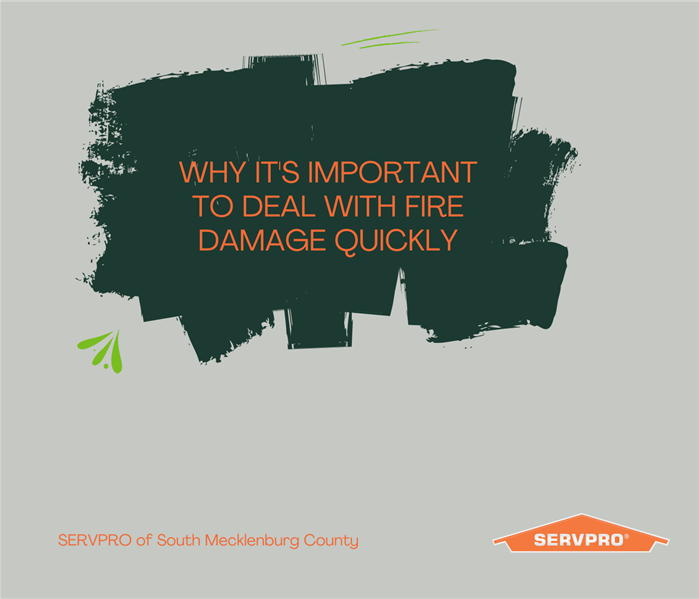 Can you postpone fire restoration?
Can you postpone fire restoration?
A fire in your Charlotte, NC, home can feel very overwhelming, and it can feel easy to put off restoration, but destruction from smoke damage will get worse without an immediate restoration. The longer restoration takes to begin, the more damage will occur and the bill for restoration will likely be larger. Avoiding costly repairs and long-term damage is easy by following these important tips.
The first thing you should always do is contact your home insurance company to make them aware of the fire. The next step should be contacting SERVPRO of South Mecklenburg County to assess the damage and give you an estimate on costs and begin the cleanup process. It is important that you only enlist the help of a licensed and insured fire damage restoration company to reduce the risk of more damage to your home. They are trained to handle fire damage and will perform some of the following tips:
- SERVPRO will try to save as many of your home and personal belongings (such as appliances, furniture, and clothing) as they can by using professional cleaning equipment and techniques.
- SERVPRO will document every item that is removed from your home by taking pictures and/or keeping a written record so you feel comfortable knowing your items are accounted for.
- SERVPRO will return any salvageable furniture and appliances back to your home after the restoration is complete.
- SERVPRO will work quickly and carefully to get you back in your home as soon as possible and stay in contact with you to make sure the repairs were done correctly and your home isn’t experiencing any problems.
After a fire occurs in your home, let SERVPRO of South Mecklenburg County deal with the stress of restoration. Give us a call at (704) 840-6112 and let us handle the damage.
Want to know more about us? Please check out our other pages:
LinkedIn Facebook Instagram Twitter Angie's List BBB Youtube Pinterest
National Fire Pup Day
10/1/2021 (Permalink)
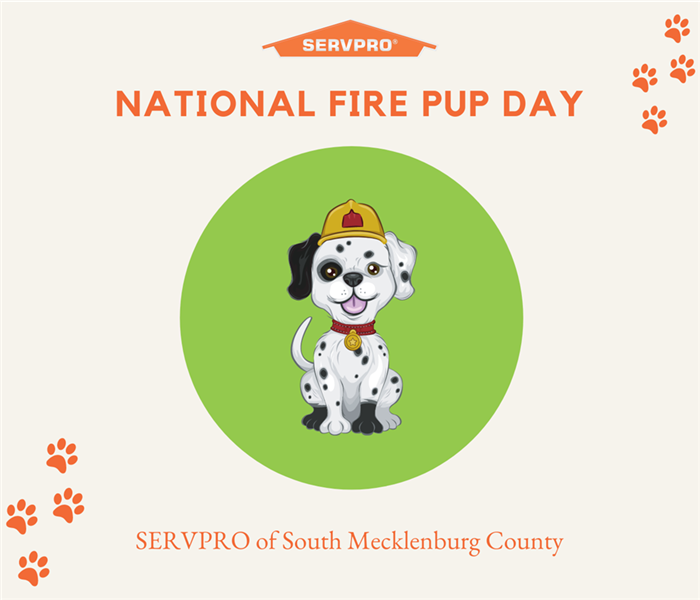 The history of firehouse dogs
The history of firehouse dogs
We all love seeing the firehouse Dalmatian in movies and tv-shows, often riding shotgun in a firetruck speeding to a fire, but do you know how they got there? In honor of National Fire Pup Day, we are going to share the history of the firehouse Dalmatian.
The Begining
Before there were firehouse dogs there were carriage dogs. Back in the 18th-century dogs were trained to trog alongside carriages to protect the carriage riders from bandits. These dogs were trained to regard strange horses as dangerous and to attack them, giving their owners time to respond to the human dangers.
Carriage dogs weren’t always Dalmatians, but they quickly became the favorite breed because of their long legs, sturdy bodies, high energy, and obedience, and endurance to keep up on the road.
Part Of The Firehouse Team
They quickly became part of the firehouse team as horse-drawn fire carriages became popular in the 1700s to protect the expensive firehouse horses, and to clear the route to a fire. The Dalmatian is also known to have a calming effect on the horses, making them the perfect companion to ease the horse’s stress as the firefighters worked to put out the fire.
The Age of The Fire Engine
As the fire engine beat out horse-drawn carriages, the fire pups were in need of a new job description. By this point, the public liked seeing the Dalmatians with the firefighters and the firefighters liked having the dogs around. The tasks of a modern-day fire pup can include:
- Companionship for firefighters
- Guarding the firehouse, and chasing out rodents
- Riding to fires and guarding the truck
- Acting as the firehouse mascot
Not only do fire pups have all the jobs listed above, but they also help with education. Dalmatians are great at helping demonstrate fire safety to the community, and especially to children. You can follow along with our local Charlotte Fire Dogs, Cat and Blaze, on Facebook.
The Modern Fire Pup
One of the most important jobs a dog in the firehouse can have is being an “arson dog.” These dogs are “sniff out minute traces of accelerants (gasoline, lighter fluid, etc.) that may have been used to start a fire,” according to State Farm’s Arson Dog Program. These highly-trained dogs work alongside firefighters or law enforcement agents to investigate the scene of a fire after the blaze has been extinguished.
More Than Dalmatians
Today, fire pups don’t have to be Dalmatians. Any size, shape, or breed can be a fire pup, but of course, the Dalmatian remains the most popular breed in firehouses.
One thing we can be sure of, no matter how advanced technology becomes, nothing can replace the companionship of the firehouse pup.
For more information on your local fire station, like how fast they respond, or the services they provide, you can always find information on our blog, or directly on the Charlotte Fire Department or Pineville Fire Department firehouse websites. And remember, SERVPRO of South Mecklenburg County is “Faster to Any Size Disaster” so give us a call (704) 840-6112 if you’ve experienced a fire in your home.
Want to know more about us? Please check out our other pages:
LinkedIn Facebook Instagram Twitter Angie's List BBB Youtube Pinterest
Safe Candle Alternatives
9/18/2021 (Permalink)
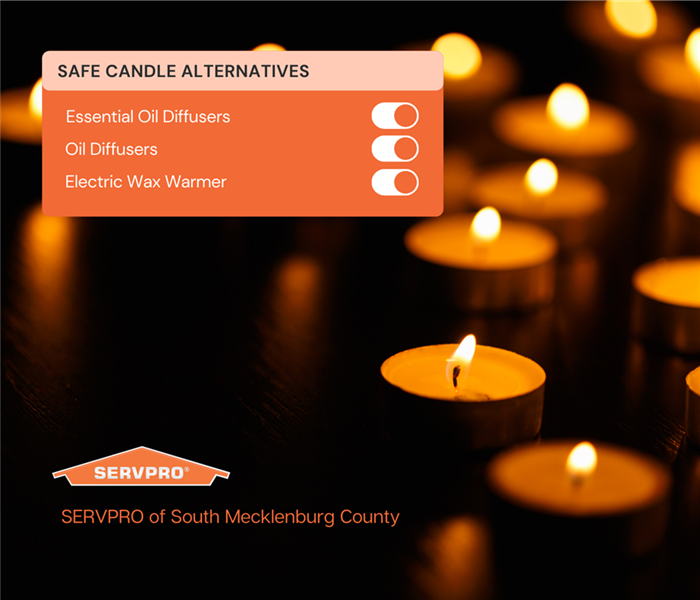 How To Prevent Home Fires
How To Prevent Home Fires
Candles can become dangerous in an instant, but people often take the risk of starting a fire to experience the lovely aroma and ambiance of candles. To keep your home safe without giving up the perks of lighting your favorite candle, keep reading about all of our candle alternatives.
1. Ultrasonic Essential Oil Diffuser
With self-care becoming more and more mainstream, it should come as no surprise that many people are using popular spa treatments in their homes. Case in point: ultrasonic aromatherapy diffusers.
Utilizing the invigorating powers of natural essential oils, ultrasonic diffusers — such as the AromaOm Ultrasonic Diffuser — are essentially small humidifiers that emit cool, aromatic mist. Not only do they fill a room with aromatherapy scents, but (unlike candles) they’re safe to leave unattended, too. And unlike the humidifiers they share technology with, they won’t significantly raise the humidity of your home.
2. Diffuser Sticks
Looking for a diffuser that lasts a bit longer? Consider a vase filled with diffuser sticks. This type of room scent not only makes for an excellent home accessory, but it also works well and isn’t too overpowering. Plus, the oil blend lasts a lot longer than an ultrasonic diffuser, so you can reap the benefits of natural scents without much fuss. Even better? These diffuser kits are easy to find at stores like Target and Walmart.
3. Electric Wax Warmer
With electric wax warmers, you can have your cake and eat it, too. Like candles, wax warmers utilize scented wax to fill a space with invigorating scents. Only, they’re much safer than candlewick, as they don’t utilize an open flame to melt the wax. Wax melts come in thousands of scents, so you won’t be missing out by switching to this safer alternative.
4. Potpourri
With so many different options for room aromas, potpourri isn’t as popular as it once was. However, it still gets the job done and can look beautiful in an entryway or on a coffee table. Look for handmade potpourri on Etsy, or make your own to get the perfect scent for your home.
5. Slow Cooker Potpourri
In addition to traditional dry potpourri, slow cooker potpourri is another great way to add some festive scents to your home, and it’s much safer than using the stove. All you have to do is add some of your favorite aromas like cinnamon sticks, cranberries, apples, etc. — to a crockpot, fill it with water, and turn it on low. With time, the ingredients will begin to simmer and give off a warm, inviting aroma. Curious to know more? Try this slow cooker potpourri recipe from Don’t Waste The Crumbs.
6. DIY Essential Oil Room Spray
Another way to make your home smell nice naturally (and without the use of candles)? With a DIY room spray using your favorite essential oil scent. We love this recipe from Hello Glow.
7. Incense
If you’re looking for a candle alternative that smells nice and requires (somewhat of) a flame, consider incense, this smoke-powered candle alternative brings a unique scent into your home with slightly less danger than a candle. One big plus? You can’t forget to blow it out because incense sticks only last for a limited amount of time.
Just be careful not to burn them close to curtains, and never leave them unattended. They may not have a flame, but the smoldering smoke can still spark a fire.
8. Use The Microwave
If the goal of lighting a candle is to make your home smell amazing, the microwave offers a safe alternative that may even do a better job. Make your home smell like freshly baked cookies without the effort when you microwave 1 cup of water and 2 tsp of vanilla extract for a minute or two. For a fresh citrus scent pop some citrus peels in a bowl of water in the microwave for a minute or two.
Keeping your home safe from fires should always be a top priority. So taking actions like swapping your candles for one of these great alternatives is a smart and easy way to keep your family safe. If fire struck your Charlotte, NC, home or business SERVPRO of South Mecklenburg County can make it "Like it never even happened."
Want to know more about us? Please check out our other pages:
LinkedIn Facebook Instagram Twitter Angie's List BBB Youtube Pinterest Yelp
Can Electronics Be Saved After A Fire?
9/17/2021 (Permalink)
 What Happens To Electronics After A Fire?
What Happens To Electronics After A Fire?
Once the fire in your Charlotte, NC, home is put out by the Charlotte Fire Department, you might notice many of your electronics were damaged by soot. That is because soot can travel throughout your entire home, even if the fire was only in one room. So even a small fire, could mean most of your electronics are damaged. But can they be saved? Keep reading to learn the effects of fire on your electronics.
Many modern electronics are sensitive and expensive to replace, so acting quickly can be the difference between saving them and spending thousands of dollars on replacement costs. Let’s look at the three different ways fire can damage your electronics:
Fire Damage
Fires produce a significant amount of heat that most household electronics are not made to withstand. When your electronics get too close to the flames, the metal and plastic components can melt, causing the device to fail.
Smoke Damage
If smoke enters through the vents of your electronics it can leave a thin black film on the electrical components. This film acts as an insulator, causing electronics to overheat or even short-circuit, possibly resulting in another fire.
Soot Damage
Soot, different from smoke, is caused by the incomplete combustion of materials. Because soot is acidic it can lead to corrosion on the interior and exterior of your electronic devices.
If your devices were in your Pineville, NC, home, or business during a fire, the best thing you can do is cut the power to all of your devices and DO NOT turn them on. Once you turn on a smoke-damaged device, the damage is irreversible. That is why it is best to leave all devices off and disconnected from power until they can be investigated by your insurance adjuster and your fire restoration expert. Our team of restoration experts can help determine if your devices need to be replaced, or if the soot and smoke can be professionally cleaned from your electronics.
If there was a fire in your Matthews, NC, home or business, SERVPRO of South Mecklenburg County is your choice for experienced fire restoration specialists. Give us a call at (704) 840-6112 day or night.
Want to know more about us? Please check out our other pages:
LinkedIn Facebook Instagram Twitter Angie's List BBB Youtube Pinterest
Positive Thinking Wont Prevent Fires
9/13/2021 (Permalink)
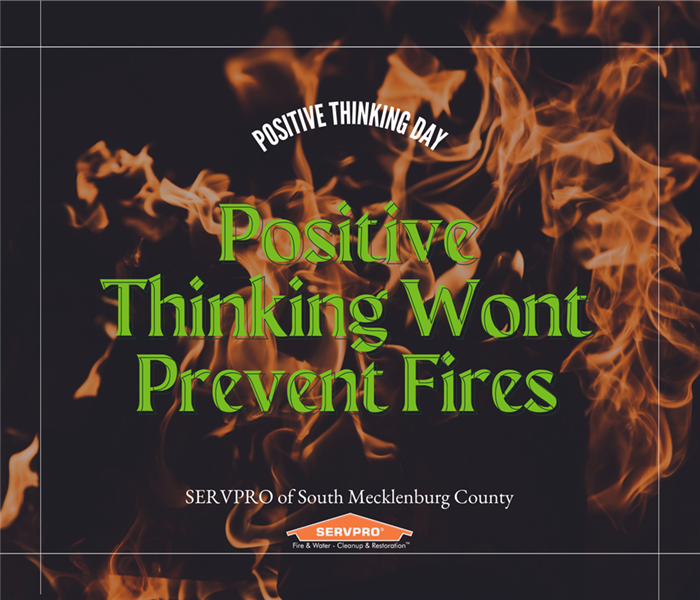 How To Prevent Fires In Your Home
How To Prevent Fires In Your Home
It’s Positive Thinking Day! And while we love having a positive outlook on life, positive thinking won’t always keep disasters from happening. Fires will strike no matter how positive your thinking is, which is why we want to share some fire prevention tips.
Avoiding fires is possible, just put your positive thinking towards fire prevention.
Prevent Fires
Inspect Heating Equipment
Heating sources can easily trigger a fire in your home or business. Ensuring all heating sources are working properly can save lives. Check for frayed wires, missing parts, and have a professional inspect your HVAC system yearly.
If your system has air filters, be sure they are changed regularly and keep the area around any heaters clean and free of flammable items.
Stay In The Kitchen
A fire can start within seconds, and leaving the kitchen with burners still on is a disaster waiting to happen. If you must leave the kitchen, turn off the burner or have someone else monitor the food while you aren’t present.
Check The Dryer
Maintaining the dryer is an essential part of fire prevention. Dryer lint can build up quickly, and an excess of dryer lint is the perfect fire starter. Make sure dryer lint is cleaned from the lint trap after each use. Have your dryer inspected once a year and have the dryer vent cleaned. Even with a lint trap, excess dryer lint can get caught in the vent, increasing the risk of fire, and making it more difficult for your dryer to work properly.
Properly Store Flammable Products
There are likely many items in your home that are highly flammable. Thinks like shaving cream, aerosols, as well as many cleaning products should be kept in a safe location to prevent further fuel to a fire. These items should be stored in a cool place, away from heat sources.
Maintain Cords
In a world of technology, you likely have many wires in your home. Be sure to check all of the wires in your home and ensure there are no frayed or chewed wires.
If any wires are running below rugs or behind furniture, try to reroute them as cords can get hot and cause fires.
Opt For Candle Alternatives
While candles can provide beautiful scents and ambiance, sometimes it is better to choose a candle alternative. Our list of candle alternatives is a great way to bring the elements of candles into your home without the danger of fire.
Use Your Fireplace With Caution
A warm fire is one of our favorite fall activities, but the joy that fire may bring is nothing compared to the damage a stray spark could cause. When you light a fire in your fireplace, be sure to never leave the fire unattended, keep all flammable items away from the fireplace, and always dispose of ashes once they have cooled completely.
Stop Fires
Install Smoke Detectors
Having smoke detectors installed in the proper places is essential to keeping you and your family safe. Be sure to make sure all smoke detectors are working properly and have fresh batteries.
Use Fire Extinguishers
Having a fire extinguisher in your home can make a significant difference in the size of the blaze. By using a fire extinguisher properly when the fire is still small, a total loss can be prevented. So make sure you and your family know how to properly extinguish a fire with a fire extinguisher.
Fires can be devastating, but proper prevention and fire management can greatly minimize the effects of a fire. Make sure to check out our other blogs to learn more about fire safety. If you experience a fire in your Charlotte, NC, home or business be sure to call SERVPRO of South Mecklenburg County at (704) 840-6112 so we can make it "Like it never even happened."
Want to know more about us? Please check out our other pages:
LinkedIn Facebook Instagram Twitter Angie's List BBB Youtube Pinterest
How Soot Travels Through Your Home
9/7/2021 (Permalink)
 How to Remove Soot From Your Home
How to Remove Soot From Your Home
If a fire has occurred in your home or business you likely will notice soot throughout the entire property, not just in the area where the fire occurred. So how does this happen? How can you get rid of the soot? Keep reading to find out more information about how soot travels during a fire and what you can do about it.
What Is Soot?
Soot is a black powdery or flakey substance that is produced when organic matter burns incompletely. This means that when things burn, they don’t completely disappear, they leave behind particles known as soot. Because soot comes from the burning of many different materials, it can also contain things like acids, chemicals, metals, soils, and dust. These soot particles leave behind a mess and often a foul smell.
How Soot Travels
When there is a fire in your home, soot can easily travel throughout your whole home. The ultra-light particles can float through the air and reach surfaces throughout your whole home. If the air conditioning or heat is running soot can even enter your HVAC system which will disperse soot throughout your whole home. When this happens air ducts should be cleaned to eliminate the HVAC system further dispersing soot throughout your home.
Can Soot Damage My Home?
Because soot has acidic properties it can further damage your home and harm indoor air quality. Soot can continue to degrade the surfaces and air quality in your home if it is not cleaned immediately.
What If There Wasn’t A Fire?
If you notice soot in your home, but there was never a fire, you might be wondering where the soot came from. Even if there wasn’t a fire, things like fireplaces, furnaces, and excessive use of candles can cause soot building throughout your home.
Is Soot Dangerous
Soot inhalation can be dangerous which is why you should only enter your home after it has been deemed safe by the Charlotte Fire Department and a fire restoration company. Improperly cleaning soot can lead to excessive inhalation of soot, and soot can be left behind, causing problems in the future.
How To Clean Soot
Cleaning soot can be difficult to remove from many surfaces as it is a sticky substance and can stain fabrics. Additionally, cleaning soot improperly can mean breathing in soot particles.
When cleaning soot, safety equipment is essential for reducing the danger of soot exposure. Specialized techniques such as air scrubbing may be necessary to reduce linger scents and restore air quality.
Using household cleaners to clean soot isn’t enough. Soot particles will leave behind a smell and stain surfaces when professional tools and cleaners are not used. fire restoration experts will be able to save your personal belongings that can’t be cleaned with household products.
If your home has experienced a fire and is in need of restoration experts, be sure to call SERVPRO of South Mecklenburg County. Our expert technicians can make it "Like it never even happened."
Want to know more about us? Please check out our other pages:
LinkedIn Facebook Instagram Twitter Angie's List BBB Youtube Pinterest
Eat Outside Day - Grilling Out For Memorial Day
8/31/2021 (Permalink)
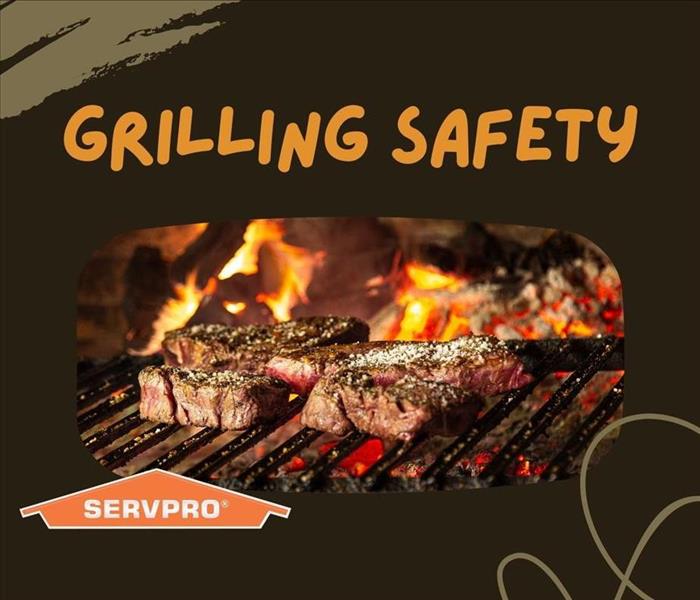 Memorial Day Grilling Safety
Memorial Day Grilling Safety
Happy Memorial Day! SERVPRO of South Mecklenburg County hopes you are able to take some time to spend with family or time to yourself this holiday. With the end of summer quickly approaching this holiday weekend, savor the last moments of warm weather by celebrating Eat Outside Day!
Many people take Memorial Day as a chance to grill outside, and it’s important to remember grilling safety this holiday to keep everyone enjoying the day in the best way possible!
Grilling is a great way to get outside! Invite friends and family and get out there and cook some meats and vegetables, but be sure to keep safety in mind.
The National Fire Protection Agency encourages grilling safety tips because nearly 9,000 fire department calls in 2014-2018 involved home grills. You can prevent the next grill fire by following these suggestions:
Check the Regulations
Some parks and outdoor areas have regulations on grilling and cooking outdoors. Be sure to check the rules before setting up and bringing a portable grill to an outdoor area. Some regions may be under a high fire danger rating, and it may be dangerous to light a fire.
Distance the Grill
Set up the grill a safe distance from objects and people. Be sure to keep the grill away from overhanging branches, lawn games, areas of high traffic, and places that children are playing. Keep children and pets a safe distance from the grill to avoid them getting hurt. Also, keep trash and wrappers away from the grill to avoid them lighting accidentally. A safe distance is three feet or more.
Dispose of Charcoal
Dispose and put out anything used to start or maintain the fire before leaving. Douse the fire with water and make sure that the area is cool to the touch. Empty the coals into a non-flammable container such as a metal can. Never empty coals into a trash can or leave them burning. Be sure to pack them out with you once they are cool.
Grill fires can be safer if you follow these steps! If you need help after a fire or have fire-related damage in your home, SERVPRO professionals can help. For any fire-related assistance and for questions, call us at (704) 840-6112. Happy Memorial Day from SERVPRO of South Mecklenburg County!
Want to know more about us? Please check out our other pages:
LinkedIn Facebook Instagram Twitter Angie's List BBB Youtube Pinterest
Fire Sprinkler FAQ
8/23/2021 (Permalink)
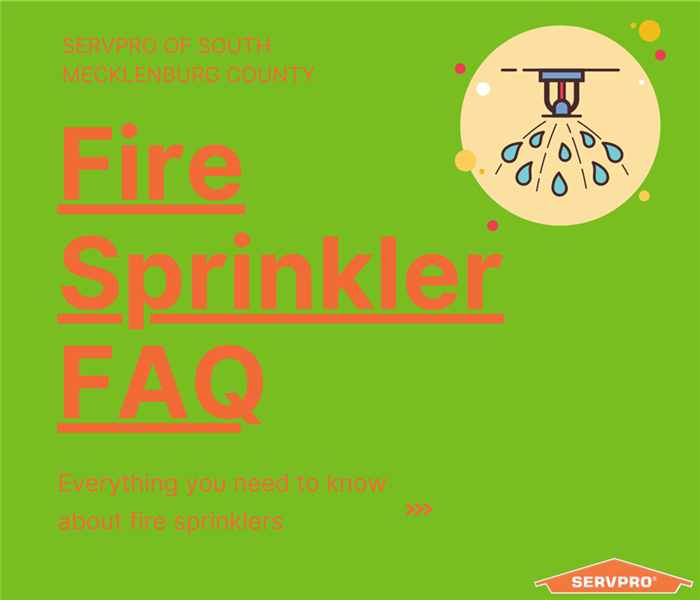 Everything You Need To Know About Fire Sprinklers
Everything You Need To Know About Fire Sprinklers
Fire sprinklers are tools designed to immediately dispense water in the event of a fire. The sprinklers can be found in many public buildings including stores, schools, and restaurants, as well as residential buildings like apartments and condos. Considering these fire sprinklers are not as commonly found in homes, many of us know little to nothing about how these devices work. These sprinklers are an essential part of commercial fire safety and it is important for us to understand how they operate. We will cover some of the most common fire sprinkler related questions and give an easy to understand explanation, just keep reading.
Q: How are the sprinkler systems activated?
A: A large increase or spike in air temperature will cause the sprinkler to dispense water. A glass bulb filled with a heat sensitive liquid holds a plug keeping the water from releasing. As the heat reaches the sprinkler, the heat sensitive liquid will expand causing the glass to burst, releasing the plug,allowing the water to be dispensed onto the fire below.
Q: Will smoke cause the fire sprinklers to activate?
A: No, only an alarming spike in air temperature will cause the sprinkler to activate.
Q: Will the activation of one fire sprinkler result in all of them turning on at once?
A: No, an increase in heat will result in the glass tube breaking, releasing the plug allowing the sprinkler to release water. As a result, only the sprinklers located near the heat source (fire) will be activated.
Q: Do fire sprinklers accidentally go off?
A: This is extremely uncommon as the sprinklers are engineered to only go off when they detect temperatures upwards of 130 degrees fahrenheit.
Q: Can fire sprinklers go bad?
A: Yes, just like most electronics they can go bad over time. It is important that these sprinklers are regularly checked by the authorized parties.
Fire sprinklers are a very important aspect of fire safety and can be the difference in putting out fires. If you are ever near a fire sprinkler that begins dispensing water, find safety as soon as possible. As previously mentioned, these sprinklers rarely accidentally discharge, meaning that there is likely a fire very close by. These sprinklers can be used in residential areas as well to better protect them from fire related damages. If you are interested in fire sprinklers for your home, you can learn more about them here on the National Fire Protection Association website..
For other tips on fire and water cleanup & restoration, SERVPRO of South Mecklenburg County is here to assist you. Find helpful information on our blog, and for any disaster, call us, day or night, at (704) 840-6112.
Want to know more about us? Please check out our other pages:
LinkedIn Facebook Instagram Twitter Angie's List BBB Youtube Pinterest
Basic First Aid Tips for Burns
8/18/2021 (Permalink)
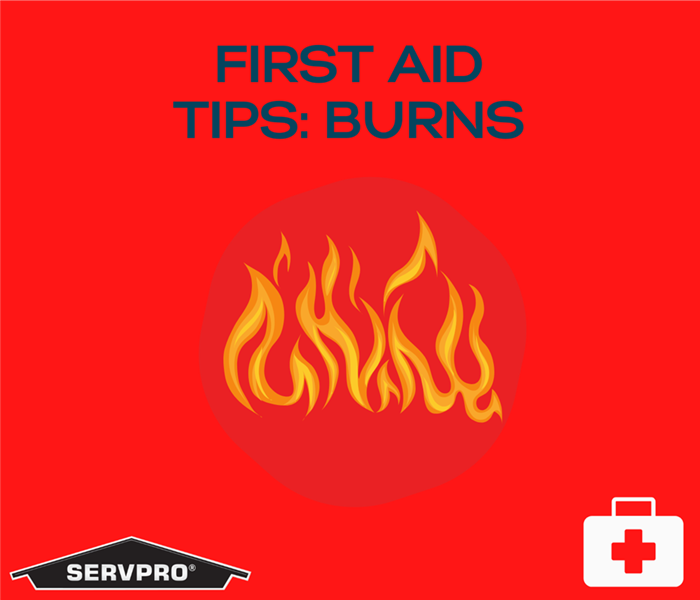 How To Treat Minor Burns
How To Treat Minor Burns
When you are cooking, baking, or doing work around your home, there is always a chance you can get a burn from hot stoves or electrical appliances. It is important to know what to do in case you or a family member gets a burn to stay safe and provide proper first aid to heal.
A burn is damage to the skin or tissue resulting from scalding, contact with flames, chemicals, or electricity, or smoke inhalation.
For major burns, call 911 or seek immediate medical care. Major burns can be discerned from minor burns if you notice deep lacerations, or if the burn causes the skin to be dry and leathery. Major burns also appear charred or have patches of white, brown, or black, or are larger than 3 inches and cover the hands, feet, or a major joint.
Some burns are able to be treated with first aid at home, and these tips can help you properly treat a burn wound. Minor burns that may not require immediate medical care may have redness similar to a sunburn, pain, blisters, and comprise an area of less than 3 inches in diameter.
Treating Major Burns (Until Help Arrives)
Major burns are serious and it is important to call for medical help right away. These steps can be taken to keep the burn safe until emergency services arrives:
Protect the Burned Person from Further Harm
Make sure that the person you are helping is not still in contact with the source of the burn. For example, if a person burns themself on a pan in the kitchen, get them away from the stove and turn off the gas or electricity. For electrical burns, make sure that the power is off before helping the burned person.
Cover the Area of the Burn
To cover the area of a burn safely, use a cool cotton cloth or bandage. Apply clean cold water to the bandage or cloth and wring out before applying to the burn. Do not immerse severe burns in cold water, as this could cause more harm. Wait for emergency services to assist the person further.
Watch for Signs of Shock
While waiting for emergency services to arrive, be sure to keep an eye on the person to assure they are okay. Elevate the burn wound above heart level if possible.
Burns are unexpected and painful, and it is important to ensure that they do not go into shock. Symptoms of shock include fainting, shallow breathing, and pale skin color.
First Aid for Minor Burns
Minor burns do not usually require extensive treatment, and first aid can be done at home. These steps can be taken to treat minor burns:
Cool Water
Run the burn wound under cool running water briefly or until the pain slightly eases. Be sure not to use too cold or icy water, as this could cause hypothermia. A cool compress or moist cloth can also be applied to relieve pain.
Bandage the Burn
Cover the burn with sterile gauze. Wrap the gauze loosely to avoid putting pressure on the burned skin. Apply antibiotic ointment. Wait to bandage once the burn is cooled, lotion or aloe vera can also be applied to provide relief.
Burns of all kinds should be dealt with with the appropriate medical treatment. As with all injuries, contacting a medical professional is always the safest way to treat any burns or other injuries. For more advice like this, visit our blog. SERVPRO of South Mecklenburg County is experienced in handling any of your fire damage needs in your Charlotte, NC home. Give us a call at (704) 840-6112, day or night.
Want to know more about us? Please check out our other pages:
LinkedIn Facebook Instagram Twitter Angie's List BBB Youtube Pinterest
How Quickly Do Firefighters Respond?
8/11/2021 (Permalink)
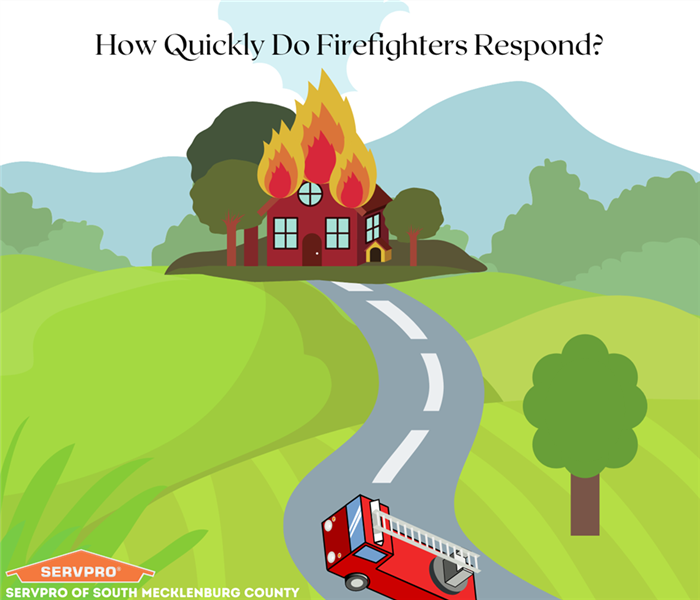 How Fast Do Firefighters Get To Your House
How Fast Do Firefighters Get To Your House
Whenever there is a fire, it is essential that the local fire department is notified as soon as possible. While we all know the red fire engine and firehouse poles, many of us have never had to rely on firefighters. If you find yourself in a situation that requires the fire department, there are some basic things you need to know.
What is the Best Way to Reach the Fire Department?
In the event of a fire-related emergency, reach safety and call 911 immediately. Give them a detailed explanation of what's happening and they will notify your local fire department.
How Quickly Do Firefighters Respond?
The National Fire Protection Association has a national goal of response times taking no more than nine and a half minutes. Firefighters are on-call 24/7 and each station has in-house firefighters at all hours of the day. The firefighters can be out of bed and en route in under 2 minutes.
What to Do if There is a Fire
- Once you have spotted the fire, immediately locate an exit and instruct others to make their way to safety as well.
- If you have a fire extinguisher on-hand, use it from a safe distance away to put out the fire.
- When you have reached a safe location, call 911 and inform them about the fire.
- Once you have reached a safe location, DO NOT re-enter the area for any reason. Wait for help to arrive and assist anyone left inside.
- Help assist people in need and alert everyone nearby.
- Inform on-scene firefighters of any details you know about the fire (including origin, location, potential hazards, or any people or pets who may still be in danger).
- Allow firefighters to extinguish the fire and keep everyone in a safe location.
After the Fire
Following the fire it is important to If your business or property has experienced a fire, be sure to contact SERVPRO of South Mecklenburg County. Call our licensed fire restoration team at (704) 840-6112. We can help make it "Like it never even happened."
Want to know more about us? Please check out our other pages:
LinkedIn Facebook Instagram Twitter Angie's List BBB YouTube Pinterest
Fire Safety Equipment You Need For Your Home
8/3/2021 (Permalink)
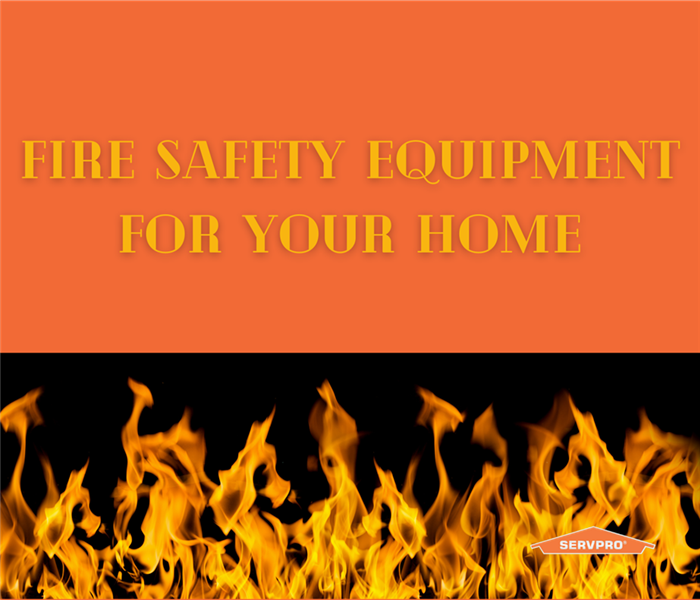 Fire Safety Devices For Your Home
Fire Safety Devices For Your Home
Living in fear of a fire happening in your Charlotte, NC home is unnecessary if you have the proper fire safety equipment easily accessible. Our homes feel like our safe place; however, your home may possess multiple opportunities for fire threats. Instances that add to the risk of a house fire include open fires and chimneys, kitchen fires from unattended cooking, overheating appliances, faulty electrical wiring or overloaded electrical systems, candles, smoking, matches and lighters, flammable liquids, and aerosols.
With so many possible causes of a fire, it is essential to have fire safety equipment to ensure that your home and your family members are always safe and protected from danger. Listed below are the five most important pieces of equipment needed to protect your home, your belongings, and your loved ones.
- Smoke Alarm - Every home should be equipped with smoke alarms because they are your first line of defense. If you already have a smoke alarm or plan to install one, check them at least once a month
- Carbon Monoxide (CO) Alarms - Carbon monoxide is invisible, odorless and can be deadly even if only a small amount is inhaled for a certain amount of time. This kind of alarm will alert you when it detects danger with a high-pitched warning, so when you hear it, get outside as quickly as you can and take in deep breaths of fresh air.
- Fire Extinguisher - This tool is critical to have in your home to put out small fires.
- Fire Blanket - A fire blanket is a simple fire safety tool that can extinguish a blaze by smothering the fire, taking away its source of oxygen.
- Fire Escape Ladders - Sometimes, the safest way to escape a fire is to exit safely out of a window. If a fire is blocking doorways, a window could be your only way to safety. These ladders are usually stored near an escape window, and one climbs down it when an emergency strikes.
- Knowledge - The most effective way to protect yourself and your loved ones is by knowing what to do when a fire occurs. Make sure you know how to properly extinguish a fire, and ensure any children are educated on fire safety.
If your business or property has experienced a fire, be sure to contact SERVPRO of South Mecklenburg County. Call our licensed fire restoration team at (704) 840-6112. We can help make it "Like it never even happened."
Want to know more about us? Please check out our other pages:
LinkedIn Facebook Instagram Twitter Angie's List BBB YouTube Pinterest
How To Properly Extinguish A Fire
7/28/2021 (Permalink)
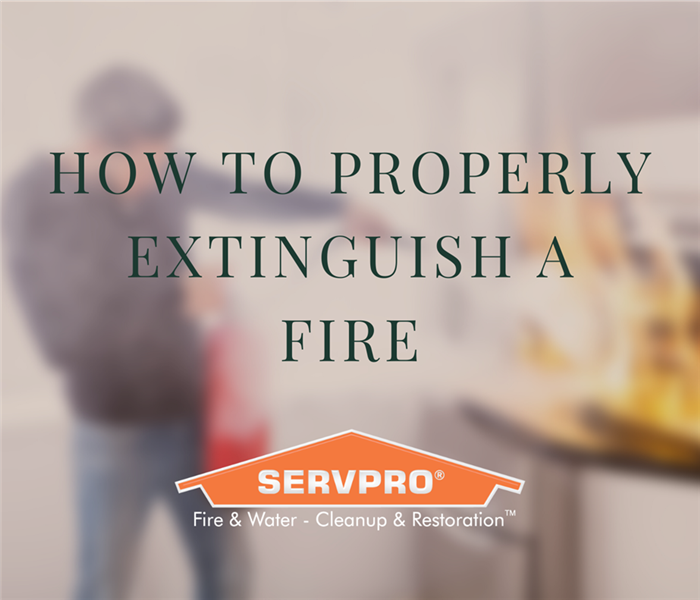 How to Put Out a Fire
How to Put Out a Fire
We’ve all seen fire extinguishers in places such as our homes, offices, or the places we visit in Charlotte, NC. Even though they are commonly recognized, we rarely consider having to use a fire extinguisher, or other means to put out a fire, in an emergency. However, it is very important to know how exactly to properly extinguish a fire, if an emergency does happen.
Portable fire extinguishers are classified by the type of fires they are designed to extinguish. Extinguishers are labeled on the outside with either letters or symbols to show which type of fire they are intended for.
To know how to properly extinguish a fire, It is necessary to distinguish the differences between types of fires. There are four different classifications of fires, each requiring a unique way to put them out.
Class A
Class A fires include ordinary solid combustible items. Some examples are paper, wood, cloth, and some plastics. Extinguishers with an A rating are designed to extinguish fires that involve these materials.
Class B
Class B fires are flammable liquids. Flammable liquids include alcohol, oil, gasoline, and grease. These types of fires are best smothered. Extinguishers with a B rating must put out these types of fires. Note that it is important to shut off the source of gas in a gas fire before extinguishing. It is safest to call emergency responders in gasoline fires.
Class C
Class C fires involve electrical equipment. Do not use water on these fires, as electrical shock could be possible. Use only Class C-rated extinguishers.
Class D
Class D fires are flammable metallic substances such as aluminum, potassium, and magnesium. These fires are common in industrial and laboratory environments. These fires should not be put out with water.
Class K
Class K fires are kitchen cooking fires that involve the combustion of liquids from food preparation. Greases, cooking oils, vegetable fat, and animal fat are all fuel sources in these fires.
Once you assure you are using the correct type of extinguisher for the fire, using a fire extinguisher can be done in a few simple steps. It can be difficult to think clearly during an emergency, so use the acronym PASS to remember the steps to using a fire extinguisher:
Pull the pin.
Aim low. Point the extinguisher at the base of the fire.
Squeeze the lever slowly and evenly.
Sweep the nozzle from the side to side as many times as needed. Keep the nozzle aimed at the base of the fire.
Using a fire extinguisher is easier than it may initially seem, and knowing how to use one can help you in an emergency. SERVPRO of South Mecklenburg County can help you with your home or business’ damage after an emergency. Simply call at (704)-840-6112.
Want to know more about us? Please check out our other pages:
LinkedIn Facebook Instagram Twitter Angie's List BBB Youtube Pinterest
Common Causes of House Fires
7/28/2021 (Permalink)
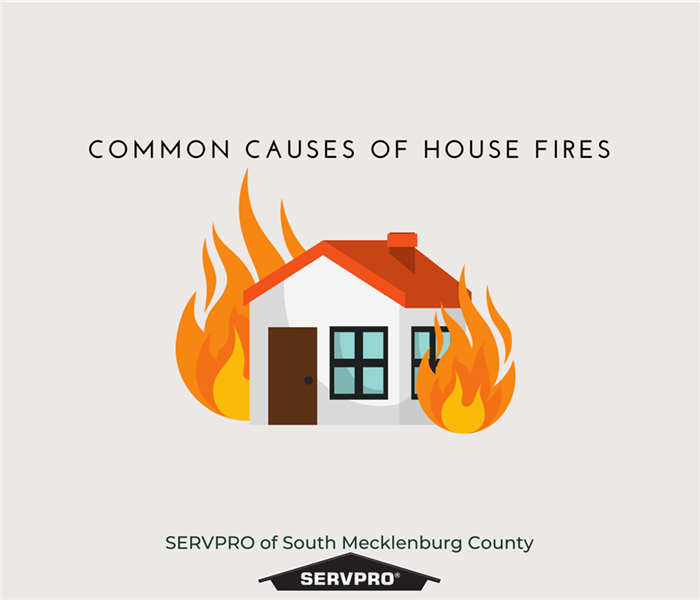 What Causes House Fires?
What Causes House Fires?
Here at SERVPRO of South Mecklenburg County, we hope everyone is enjoying this much-needed summer and staying safe while doing so. Charlotte has been beautiful recently and most outdoor activities have fully reopened. Today we will be talking about the common causes of house fires as well as some ways to prevent them, so you can keep your family safe.
The Culprits
There are many ways that a fire can be started by mistake. Some of these are the result of user error while others can be unpreventable by a homeowner.
- One extremely common cause is by leaving a candle unattended, allowing it to catch something on fire
- When cooking, make sure you stay in the kitchen from start to finish as unsupervised cooking can result in a fire. If children are involved in the cooking process it is essential that you keep an eye on them to keep everyone safe.
- Smoking a cigarette carelessly or while falling asleep is extremely dangerous and poses a high risk of accidental house fires.
- Heaters are also very prone to creating fires, making it essential that they are unplugged when not being used. If you are using a heater, ensure that you are awake and in the room to keep a close eye on it.
- Faulty wiring is one of the most common fire starters. Unfortunately, faulty wiring is nearly impossible for the average homeowner to spot. If you suspect faulty wiring please contact your local electrician immediately.
Ways to Prevent Fires
Most fire prevention methods are quick and easy, and they just might save you from dealing with a house fire. Whenever you leave your home, make sure to blow out any lit candles and to unplug any appliances that pose the risk of overheating. If you are a smoker, make sure you smoke outside and away from any flammable materials. When cooking, make sure to stay in the kitchen throughout the process, and always supervise children when they are near the stove. Once finished, make sure that the stove and any other appliances used are turned off completely.
If There is a Fire
We hope that you never find yourself in a situation where you are affected by a fire, but if you are, it helps to be prepared. Keep a fire extinguisher handy and always keep fresh batteries in your home’s smoke detectors. If a fire does occur in your home, it is best to safely exit the building and call the fire department immediately. Here at SERVPRO of South Mecklenburg County, we specialize in fire damage repair, and we are always here to help in your time of need.
Want to know more about us? Please check out our other pages:
LinkedIn Facebook Instagram Twitter Angie's List BBB Youtube Pinterest
Teaching Kids Fire Safety
7/16/2021 (Permalink)
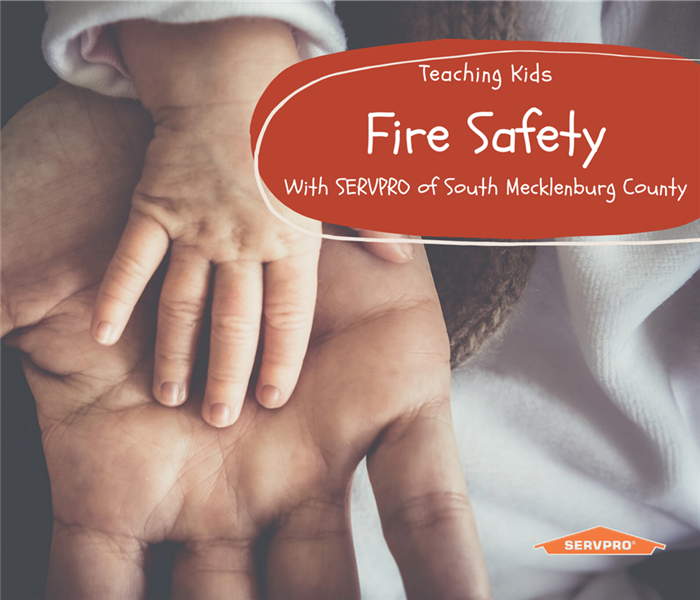 How to teach children fire safety
How to teach children fire safety
Would your children know what to do in the event of a fire in your Charlotte, NC, home? Making sure your children are prepared in the event of a fire emergency can help ensure their safety. So how should you teach your children about fire safety? Keep reading to find out.
Smoke Detectors
Start by teaching your children about smoke detectors. Talk about why they are installed, how the smoke detectors work, and the sound they make. To stay safe, children should be able to associate the sound of the smoke detector with fire and know what to do when they hear that noise.
Tip: Change the batteries in your smoke detector often to prevent the noise from startling children.
Plan Escape Routes
When planning escape routes with children, creating two plans for each room is the best way to keep children calm and safe during a fire. For most rooms, this means using a door and a window in the escape route.
Once you have established a plan for getting out of each room, select a designated meeting space outside your home, like your mailbox, driveway, sidewalk, or even a neighbor’s yard. Make sure the whole family knows the selected meeting space for emergencies.
Tip: If your child’s instinct is to hide when they are frightened, teach them the phrase “Don’t hide, go outside.”
Practice Opening Windows
Many children are not taught how to open windows to ensure they don’t injure themselves, but in case of a fire knowing how to open windows can save lives. Ensure that windows are not stuck and can be easily opened and that screens and security bars can be removed quickly if necessary.
Practice Using Escape Ladders
If your home has a second floor, escape ladders can be an essential part of fire safety. Keep escape ladders near second-story windows and be sure to practice using them with your children. If your children are young, practice using a first-floor window so they know what to expect.
Check for Heat
Teach children to check how hot a door is before opening in case of a fire. If a door is hot, tell them how to find another way out, like a window. If they are unable to find an exit teach children to cover themselves with a towel and get low to the ground by their bed.
Make Fire Safety a Game
If your children aren’t interested in practicing fire safety, try using a game to teach them how to safely escape from your home. Blindfold your child and have them make their way through your home. Set it up as an obstacle course with a treat waiting at the end for even more fun.
Get Out & Stay Out
Make sure to teach children that once they have exited the house, they need to go to the designated meeting place, and stay there. Even if a family member or pet is missing, children should know they should never venture back inside.
Stop, Drop, & Roll
Your children have likely heard of stop, drop, & roll, but it’s important that they are prepared to practice it in the event they get too close to flames. Many fire-related injuries can be avoided or minimized if a child stops, drops, & rolls rather than running. Be sure to act out the proper form and have them practice with you so they can be prepared.
Practice
Creating an escape plan and teaching it to your children is essential to their safety, but so is updating the plan and practicing it. Schedule fire safety practice at least twice a year, or more often for younger children.
What Next?
For more information on preparing your family for fire-related emergencies, the National Fire Protection Association is a good resource. Be sure you have the right fire extinguisher in your home, and that you know when how to properly use it.
If you and your family experienced a fire-related emergency, you might be unsure of what to do once the Charlotte Fire Department has put out the fire. SERVPRO of South Mecklenburg County is here to help. As your local fire restoration, we are here to “Like it never even happened.”
Want to know more about us? Please check out our other pages:
LinkedIn Facebook Instagram Twitter Angie's List BBB YouTube Pinterest
National Pet Fire Safety Day
7/15/2021 (Permalink)
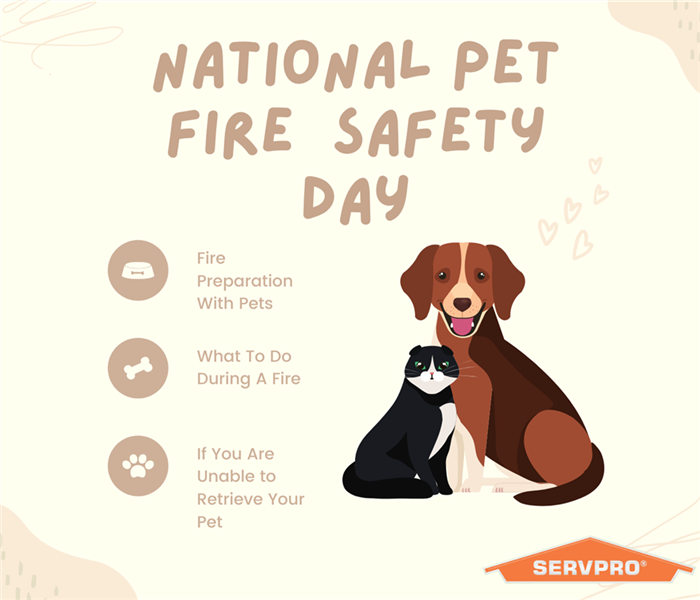 How to Keep Pets Safe During Fires
How to Keep Pets Safe During Fires
We love all of our pets, and today, July 15th is National Pet Fire Safety Day! On National Pet Fire Safety Day, it is important to remember to include your furry family members in your emergency fire plan. It is necessary to have a plan to figure out how you will get your family members to safety in addition to your pets. Here are steps to prepare for a fire and keep your pets safe too:
How to Prepare for A Fire Considering Pets
To prepare for a fire in Charlotte, NC, first talk to your family and your friends to determine an emergency plan that includes them. Have emergency supplies readily available somewhere within your home, and keep them somewhere in your home that is easily reachable in an emergency. In an emergency supply kit, include supplies such as pet food, medication, water and also include a photo of your pet for identification, any leashes or carriers needed in case you must leave your home, and medical records for you and your pet. Discuss places your pet likes to hide with your family. Make sure everyone knows how to get them out quickly in case of an emergency.
During a Fire
If a fire does occur, be sure to grab your pet’s leash or carrier as you leave the building. Keep your pet nearby and secure once you are safely outside. Your pet may be overwhelmed, and it is important to keep them close to avoid them trying to run to a safer area. If it takes too long to locate your family pet during a fire, leave, and leave your home’s door open and call to your pet once you are safely outside. Do not delay leaving in order to assist your pet, once emergency services arrive, they will do their best to get your pet to safety.
If You Are Unable to Retrieve Your Pet
Emergency situations are unpredictable, and in case you are unable to retrieve your pet or happen to not be home during a fire, put a sticker or decal in your home’s window that specifies how many pets you have and what type they are to assist the emergency responders in helping your pet. To ensure your pet’s safety, install smoke detectors that alert the fire department when they go off to automatically dispatch emergency services.
Your pets are important, and keeping them safe should be a top priority. For more helpful tips to prepare your entire family for emergencies be sure to read our other blogs.
If your home has been damaged by a fire recently, SERVPRO in South Mecklenburg County can help. For more information about our services, contact us at (704) 840-6112.
Want to know more about us? Please check out our other pages:
LinkedIn Facebook Instagram Twitter Angie's List BBB Youtube Pinterest
The Danger Of Soot After a Fire
7/9/2021 (Permalink)
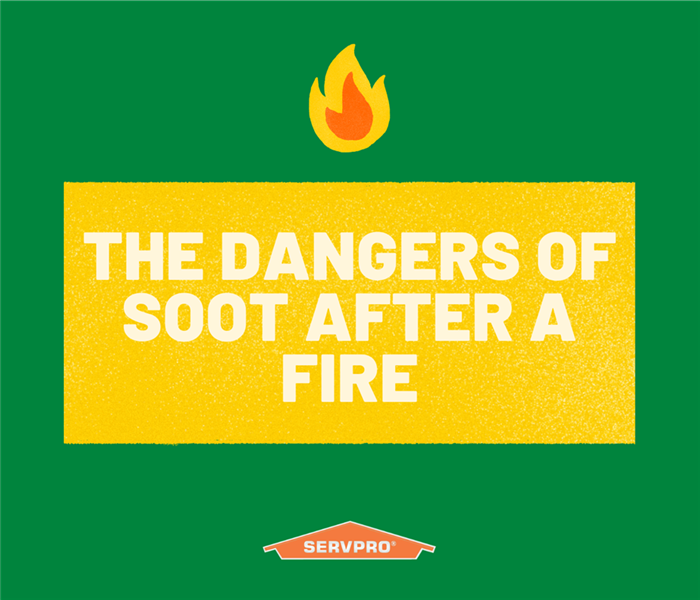 How to Clean Soot After a Fire
How to Clean Soot After a Fire
Unfortunately, the effects of a fire in your Charlotte, NC home or business can reveal themselves well beyond the fire’s occurrence. The most common cause of house fires is from cooking, usually when an individual leaves a pot or a pan unattended until smoke emerges from the kitchen into surrounding rooms. Sometimes the resulting smoke and soot can leave more damage than what the actual fire left behind, but rest assured, our clean-up crew at SERVPRO of South Mecklenburg County knows just how to clean every crevice and stop the spread of soot and smoke.
What Is Soot?
Soot is a powdery, flaky substance that is composed mostly of carbon that can travel through the air and is the result of incomplete combustion of materials such as coal, oil, and wood. While it is harmful to those residing in the home or property, it also can be very difficult to completely remove because of its sticky consistency that can stain walls and surfaces if it is not treated quickly and properly.
How Do I Identify Soot?
Individual soot particles are very small; in fact, they are smaller than dust particles. When they accumulate into dark black dust spots is when it becomes visible to us. Soot build-up can be found in areas far away from where the original source of the fire is because it travels easily through the ventilation system or even just through the air. Soot also has a distinct smell - hints of smoke, ash, or a general smelly odor are usually a result of soot formation.
Is Soot Harmful?
Soot is harmful because the particles contain acids, chemicals, metals, and dust from the substances burned during a fire. These particles then latch on to the surrounding environment, leaving your walls and ceilings prone to side effects like unappealing odors and stains.
If soot build-up is untreated for too long or improperly tended to, especially in your HVAC system, tiny amounts of soot can be circulated throughout your home, making the cleaning process more difficult.
Next Steps
It is highly recommended to hire a professional team to effectively clean up after a fire has occurred, such as those at SERVPRO in South Mecklenburg County. For more information about our services, contact us at (704) 840-6112.
Want to know more about us? Please check out our other pages:
LinkedIn Facebook Instagram Twitter Angie's List BBB Youtube Pinterest
Happy Independence Day!
7/4/2021 (Permalink)
 How to Celebrate The Fourth of July in Charlotte, NC.
How to Celebrate The Fourth of July in Charlotte, NC.
Happy Independence Day! Americans come together on this day to celebrate the birth of American independence from Britain and the signing of the Declaration of Independence on July 4th, 1776.
Not only is the Fourth of July a day to remember 245 years of American history, but it is also an exciting time to relax in the summer heat and spend time with family and friends. Read on for suggestions on how to enjoy the Fourth of July holiday in Charlotte, NC, this year!
1. Attend a Fireworks Display
A fireworks display is a great way to get outside and participate in a long-time tradition on the Fourth of July. Fireworks often are red, white, and blue representing the colors of the American flag! Many local communities host public firework shows that you can attend with friends and family. Be sure to bring your blanket or chairs to sit on and enjoy the display.
2. Go to a Local Parade
A parade can be a great way to engage kids or to hang out before the nighttime festivities of the Fourth begin. Parades often have candy, floats, and local emergency services such as fire trucks on display, which can be a great way to get involved and learn more about the community.
3. Have a Picnic
A picnic is a fun way to spend the day in the sun on the Fourth of July. Grab your picnic blanket, a cooler, and your favorite snacks, and head to a local park to enjoy lunch! We recommend classic summer foods such as grilling hot dogs and bringing potato chips and watermelon for a classic American experience.
4. Make Fourth of July Treats
Making Independence Day treats can be a fun way to spend time with friends and get into the holiday spirit! Check out this easy recipe for Firecracker Bites to spice up the holiday!
5. Make Dinner/ Barbecue
End the day with a barbecue with your family. This is a perfect way to prepare for a long fireworks show and hang out outside in the summer once it’s cool. Get coals and a grill and get creative! Vegetables and buns can be grilled in addition to meat for a healthy vegetarian option!
Happy Independence Day from SERVPRO of South Mecklenburg County! Be sure to be careful and to stay safe with any activity you do this holiday. If you or your family want to hear more fun tips from our team, be sure to visit our blog at https://www.SERVPROsouthmecklenburgcounty.com/blog or call (704) 840-6112.
Want to know more about us? Please check out our other pages:
LinkedIn Facebook Instagram Twitter Angie's List BBB Youtube Pinterest
Firework Safety Tips
7/3/2021 (Permalink)
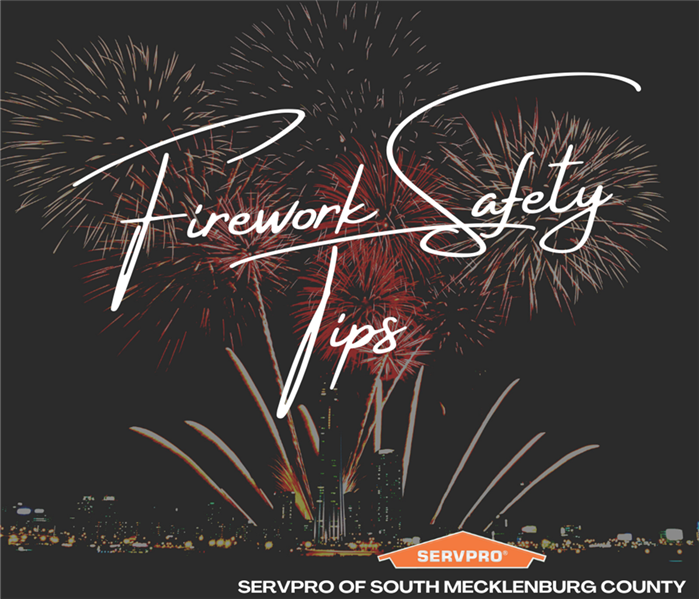 How to Use Fireworks Safely
How to Use Fireworks Safely
With summertime in full swing, many are jumping at the opportunity to set off some fireworks for our country’s celebration of independence. While fireworks are undoubtedly fun to set off and watch, they can be quite dangerous when used irresponsibly. An average of 15,600 people are hospitalized in firework-related incidents during the days before and after the 4thof July. As you celebrate your summer with your own firework shows, SERVPRO of South Mecklenburg County wants to make sure that you practice firework safety when having fun this holiday weekend.
Preparing for Lighting Fireworks
Considering many people go out of town to celebrate the 4th, it is vital to note the local emergency hotlines. Additionally, a first-aid kit should be bought and located nearby before the lighting of any fireworks. Considering fireworks’ ability to start fires, a fire extinguisher or buckets of water should be kept within close proximity to the launch site.
Tips on Using Fireworks Safely
It is essential to ensure that the individuals in charge of lighting the fireworks are sober as it lowers the risk of putting those around them in danger. As fireworks are hazardous, children mustn’t be allowed to participate in the lighting of the fireworks. Those who light the fireworks should ensure that they wear eye protection and maintain a safe distance from the firework after lighting it. When using fireworks, ensure that there are no buildings or vehicles within a reasonable distance to lower the risk of property damage. If a firework does not go off as it is supposed to, wait a reasonable amount of time and then soak it in water before properly disposing of it.
In the Event of a Firework Related Accident
In the event of a firework-related accident, it is essential that someone within your group has a phone so they can call an emergency response team. We here at SERVPRO of South Mecklenburg County hope that you and your guests have a relaxing and enjoyable 4thof July. If you experience any fire-related property damage, we can be reached at (704)-840-6112 and will be ready any time, day or night, to help you in your time of need.
Want to know more about us? Please check out our other pages:
LinkedIn Facebook Instagram Twitter Angie's List BBB
Is Fire And Soot Damage Permanent?
6/14/2021 (Permalink)
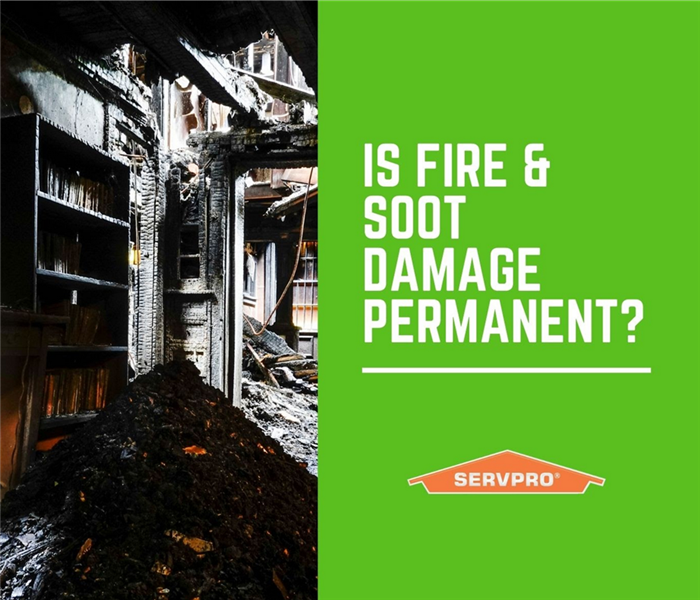 Can I remove soot damage from a fire?
Can I remove soot damage from a fire?
After a fire is put out in your Charlotte, NC, home, it can be overwhelming to deal with the next steps in restoring your living space. The effects of smoke and soot are often unrealized after a fire. However, homeowners should be aware that smoke and soot can cause more damage than the fire itself. After the fire is out, smoke and soot will settle onto the floors, walls, ceilings, furniture, and other surfaces. This can cause severe tarnishing to your home and the belongings in it. Without immediate fire damage restoration following a home fire, these effects can become permanent.
The Different Types of Fire Damage
Wet Smoke
Homes that experienced a smoldering fire burning at low heat may find wet smoke residue. Wet smoke residue is clammy and sticky, unlike dry soot found in other fast-burning fires. Wet smoke is more difficult to clean because it can easily smear without the right cleaning products. If you notice wet smoke in your home, do not enter the area as you can spread this hard-to-clean soot throughout your home.
Soot Spreading
As materials burn, chemical combustion occurs, resulting in soot. Soot is a powdery, black substance that is produced when a fire doesn’t completely burn its fuel source. When the fire occurs, the soot ionizes and becomes attracted to many different surfaces and can also enter your HVAC system and be distributed throughout your home. When the soot enters your air ducts, it is easily spread throughout your house, leading to soot damage in rooms where the fire may not have reached.
Staining and Odors
After a fire, smoke damage will be visible, but other damage may initially be challenging to see. It is common for smoke-damaged walls to turn yellow after a few days. Marble and granite countertops and exposed wood can also become permanently discolored if not treated right away. Metal can also become tarnished as a result of smoke damage. Clothing and furniture may have residue of smoke and smell like fire because smoke particles settle on these fabrics. Many of these items can be restored if a professional fire restoration company can begin the restoration process immediately.
When damage is found in your home after a fire, action must be taken quickly. SERVPRO of South Mecklenburg County can assure you that an experienced team of fire restoration technicians can respond to your situation as soon as possible and assess the fire damage properly.
Want to know more about us? Please check out our other pages:
LinkedIn Facebook Instagram Twitter Angie's List BBB
Do I Have to Move Out After a Fire?
6/7/2021 (Permalink)
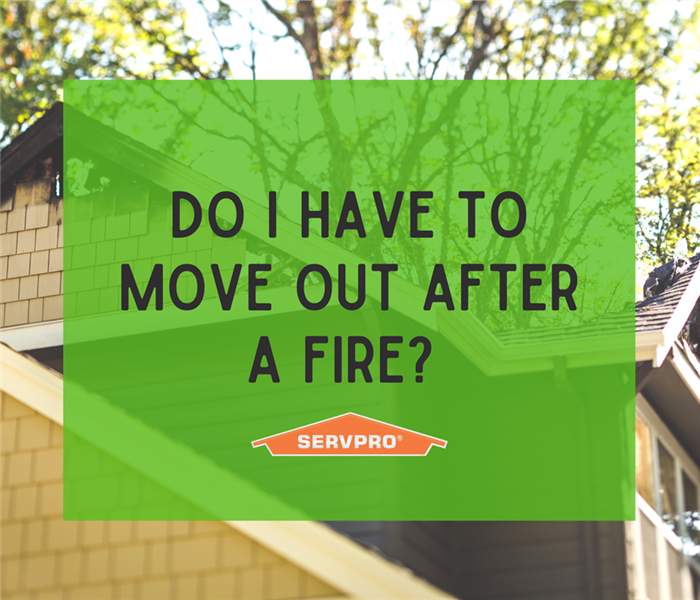 Do I have to move out after a fire?
Do I have to move out after a fire?
A fire in your home can cause serious damage. Your home and many of the things in it may be damaged by flames, heat, smoke, and water. Things not damaged by the fire still may be ruined by smoke and may end up soggy with water used to put out the fire. Firefighters may have broken windows and cut holes in the roof to slow the fire’s growth. They also may have to cut holes in your walls to make sure that the fire is entirely out and not hidden in the walls.
Entering your home can cause further damage to the structure. Be very careful when entering not to touch or disturb the fire-damaged items.
When fire damages your Charlotte, NC home, you often can be unsure of what to do next. Fire damage can be dangerous, and life-changing. The fire department will determine if your home is safe to move back into after a fire. However, there are steps you can take to determine if it is necessary to move out of your home.
Take Care of Yourself and Your Family
Contact your local disaster relief service, they will help you after the fire to find food, clothing, medicine, and a place to stay. If you have pets, find and comfort them after a fire and be sure to keep them away from the house until clean-up has been completed to keep them safe. Do not enter your home unless the fire department says it is safe.
Contact Your Insurance Agent
Right away following a fire, it is important to contact your insurance agent and ask them what to do first. When you contact your insurance agent, ask and understand what is covered by your insurance. If you do not have insurance, organizations such as the Red Cross, Salvation Army, and Community Groups can possibly assist you in restoration after a fire.
SERVPRO of South Mecklenburg County specializes in fire restoration. We remove any fire damage and clean and restore your personal items that may have been damaged. If you have experienced a fire in your home, give us a call any time, day or night at (704) 840-6112.
How Appliances Can Start Fires
5/4/2021 (Permalink)
Our everyday lives would be made much harder if it weren’t for the appliances we surround ourselves with. Newer technology and appliances are equipped with more and more features, which means more circuitry. However, appliances can increase the risk of electrical fires in your Charlotte, NC home or business.
Your home’s extensive electrical system and electrical appliances can cause an electrical fire.
Unlike a fire that starts with a visible flame, electrical fires tend to happen within a wall. They come to our attention after they have already broken through the barrier they started behind, and that is when action must be taken.
If you notice a fire break out in your home, be sure to follow our tips on proper fire extinguisher use and confirm that your smoke alarms are properly installed.
In 2015, the National Fire Protection Agency(NFPA) reported over 500,000 structure fires in the United States. Common home appliances that can cause a fire are dishwashers, dryers, microwaves, refrigerators and toasters.
Prevent Appliance Fires With These Tips:
- Ensure that the installation of your home’s electrical wiring system remains updated and sufficient.
- Replace outlets when they are old or damaged
- Avoid overloading power strips, using damaged power cords or running an extension cord under a rug.
- Never remove the third prong from a power cord.
- Look out for issues with your circuit breaker, burning smells, hot outlets, flickering lights and sparking or buzzing outlets.
If your home or business in Charlotte, NC has experienced an appliance fire, we are here t0 help! SERVPRO of South Mecklenburg County can help with additional questions or concerns at (704) 840-6112!
Want to know more about us? Please check out our other pages:
LinkedIn Facebook Instagram Twitter Angie's List BBB
How Fire Extinguishers Reduce Property Damage
4/5/2021 (Permalink)
Once a fire has started in your Charlotte, NC, business, or home, it is important to jump into action quickly. Before taking action it is important to know the proper action to take. The size of the fire will determine what you should do next. If the fire is large, it is best to evacuate everyone from the building and call the Charlotte Fire Department to put out the fire. With a small fire, a fire extinguisher may be able to save your property from serious damage.
It may seem scary to stop and put out the fire rather than leaving the building, but there are a number of reasons why this is recommended. Putting out the fire quickly can save thousands of dollars. If you stop the blaze early enough, there is an opportunity to reduce smoke damage, soot damage, and possible water damage.
You could even prevent having to fully evacuate the premises. When using a fire extinguisher remember to use the PASS method. It is also important to properly maintain your fire extinguisher properly. When the fire is completely out or the fire extinguisher is empty stop and leave the premises until the Pineville Fire Department arrives.
Whether your Matthews, NC, home or business was the victim of a small kitchen fire, or something much larger it is important to call in the fire specialists to perform cleanup and restoration services. Bringing in SERVPRO of South Mecklenburg County means our team of highly trained technicians can get your home or business "Like it never even happened," in the quickest more comprehensive way.
Want to know more about us? Please check out our other pages:
LinkedIn Facebook Instagram Twitter Angie's List BBB
The Cost Of A Fire
3/29/2021 (Permalink)
After a fire in your Charlotte, NC, home or business one of your most pressing questions might be how much the restoration process will cost. There is no average fire, so it can be dangerous to start with only looking at the average cost and assuming your situation will match the average. Here are some questions that can help understand the cost of the restoration process:
Damage:
Some fires may only damage a small portion of your home, others may distribute extensive smoke and some may cause serious structural damage. The extent of the damage is based on multiple factors and this is something that only a fire remediation specialist can answer.
How The Fire Was Extinguished:
Depending on how the fire was put out, there could be more extensive damage than just a fire might cause. If the fire is put out with water there could be extensive water damage in the area of the fire as well as below it. A fire extinguisher may cause less damage, but is generally only used on smaller fires.
Looking At The Cost:
Once the damage has been assessed your local SERVPRO will create a quote for your insurance company. In most situations, insurance will cover all of the costs and your only cost should be a deductible. Your insurance company could be covering restoration costs that are as low as $2,000 to over $70,000, with an average of $37,000. For more information click here.
The best way to know what your cost will be is to contact SERVPRO of South Mecklenburg County to assess the damage and estimate restoration costs. It is also important to contact your insurance company after fire damage as well.
Want to know more about us? Please check out our other pages:
LinkedIn Facebook Instagram Twitter Angie's List BBB
Fire Safety With Disabilities
3/19/2021 (Permalink)
Living in a home when you or a family member has disabilities brings unique risks when a fire breaks out, here is how to prepare.
- Sprinkler Systems: having a sprinkler system installed in your home can keep fires small and give people more time to escape a fire. When choosing a home look for one with a system already installed.
- Smoke Alarms: Install smoke alarms using advice from our blog post. It can also help to use sealed long-life batteries for people who are not able to change batteries easily.
- Escape Planning: Every home should have an escape plan and practice a drill with everyone in the home. Keep a phone near the bed to call for help if you are unable to escape by yourself.
- Contact The Fire Department: Have your local fire department review your escape plan. Some fire departments keep a directory of people who need extra assistance as well as service animals.
- Deaf or Hard of Hearing: Smoke alarms with strobe lights are an important addition to a home with anyone who is HOH. Special pillows or bed shakers are also helpful when you are asleep.
If your home or business experiences a fire disaster, be sure to contact a fire restoration company to remediate the damage.
Additional resources are available on the National Fire Protection Association website.
Want to know more about us? Please check out our other pages:
LinkedIn Facebook Instagram Twitter Angie's List BBB
Fire Risks in Rural Areas
3/17/2021 (Permalink)
Living in a rural area puts you and your family at higher risk for death, loss of property, emotional and economic impact from a fire. Here are common problems to look out for:
- Heating is one of the more common causes of residential fires and deaths.
- Heaters like wood stoves are the root of most heating fires.
- Barn fires and other farm building fires are most often caused by damaged electrical equipment.
- Rural homes and farm buildings are less likely to have smoke alarms.
If your home or business experiences a fire disaster, be sure to contact a fire restoration company to remediate the damage.
Additional resources are available on the National Fire Protection Association website.
Want to know more about us? Please check out our other pages:
LinkedIn Facebook Instagram Twitter Angie's List BBB
Fire Risks in The City
3/15/2021 (Permalink)
Did you know living in a city has different fire risks than rural areas? Living in Charlotte, NC, means that there are areas of higher risk. Areas with limited resources, high-crime and multicultural communities have higher instances of fires.
Older cities and buildings are at a higher risk due to electrical equipment that is outdated or damaged.
Rates of intentional fires are also elevated in larger cities.
To read more reports from the National Fire Protection Association follow this link.
Want to know more about us? Please check out our other pages:
LinkedIn Facebook Instagram Twitter Angie's List BBB
Is There a Difference Between Partial and Total Losses?
3/12/2021 (Permalink)
After a loss in your Matthews, NC, home or business you may be wondering what the restoration process will look like. If you have had a partial loss there will likely be restoration and repairs required, if there is a total loss you may need a complete rebuild.
If only a particular area of your Pineville, NC, home or business has sustained fire damage, while other areas only have smoke or heat damage. The most common types of partial loss are burnt or charred building materials or contents, heat-damage or smoke damage. If the building is still structurally sound it can still be classed as a partial loss. A total loss is a situation in which the property damage is so extensive the entire building has burned down or is no longer structurally sound.
In a partial loss, restoration is still an option. This will involve cleaning and restoring the building. Even if part of the structure needs to be rebuilt, as long as the remaining sections of the building remain structurally sound, this would be classed as a partial loss.
Fire damage in your Charlotte, NC, home or business will likely damage some contents. Getting a professional inspection can help with your claim settlement. The assessment should include fire, heat and smoke damage. The best situation is when the insurance policy covers the entire replacement cost of the item, rather than the value with depreciation.
If you have experienced a partial fire loss, cleanup and restoration experts will help assess the damage. Oftentimes fire damage can appear more minor than it actually is. An experienced fire restoration company like SERVPRO of South Mecklenburg County can inspect and identify the extent of the loss and assist with the property insurance claim.
Want to know more about us? Please check out our other pages:
LinkedIn Facebook Instagram Twitter Angie's List BBB
How to Maintain Your Fire Extinguisher
3/3/2021 (Permalink)
It is always important to maintain fire extinguishers, checking your extinguisher occasionally can ensure it is in working order in case of a fire. Here’s how to keep your fire extinguisher working properly:
Easy Assess: Your fire extinguisher should also be easy to access. There shouldn’t be anything blocking it or limiting the ability to reach it.
Pressure Level: Many fire extinguishers have pressure gauges to show when the pressure is high or low. If the pressure is not in the normal range it may be time for a new extinguisher.
Damage: The can, hoses and nozzles should be inspected for damage, dents and rust to ensure all the parts are working properly.
Cleanliness: Dust, oil and grease should be cleaned off the extinguisher.
Guidelines: Depending on the extinguisher they need to be maintained differently. Some should be shaken monthly, others should be pressure tested on regular intervals. Be sure to check the manufacturers guidelines to keep your extinguisher in proper working order.
If a fire in your Charlotte, NC, home caused damage before you could put it out, be sure to call SERVPRO of South Mecklenburg County.
Get Social With Us: LinkedIn Facebook Instagram Twitter Angie's List BBB
For more fire extinguisher safety visit the FEMA website.
Do You Know How to Use a Fire Extinguisher?
3/1/2021 (Permalink)
Having a fire extinguisher on hand in your home can save lives, but even if you do have one, do you know how to use it? When a fire is burning through your home is not the time to learn how to use a fire extinguisher. When using a fire extinguisher use the word PASS:
Pull the pin. While holding the fire extinguisher, point the nozzle away from you and release the locking mechanism.
Aim low. Point the fire extinguisher at the base of the fire.
Squeeze the lever slowly and evenly.
Sweep the nozzle from side-to-side.
Whenever using a fire extinguisher it is important to be safe, never point the nozzle at another person and it is not recommended that children operate extinguishers.
If a fire in your Charlotte, NC, home caused damage before you could put it out, be sure to call SERVPRO of South Mecklenburg County.
Get Social With Us: LinkedIn Facebook Instagram Twitter Angie's List BBB
For more fire extinguisher safety visit the FEMA website.
When to Use Your Fire Extinguisher
2/26/2021 (Permalink)
Fire extinguishers can save lives and stop fires before significant damage occurs in your Charlotte, NC, home. So when should you use that fire extinguisher? Before you use that fire extinguisher you need to answer yes to these questions:
- Have I alerted everyone in the building that there is a fire?
- Has the fire department been contacted?
- Can I physically use a fire extinguisher?
- Is the fire small and contained (like a pan or trashcan)?
- Am I safe from smoke?
- Is there a clear escape route?
If you aren’t sure about whether it’s safe to use a fire extinguisher, and for situations where you cannot answer yes to all of the above questions, alert others, leave the building and call 911.
If a fire in your Charlotte, NC, home caused damage before you could put it out, be sure to call SERVPRO of South Mecklenburg County.
Get Social With Us: LinkedIn Facebook Instagram Twitter Angie's List BBB
For more fire extinguisher safety visit the FEMA website.
Did You Know There is More Than One Type of Fire Extinguisher?
2/25/2021 (Permalink)
Having a fire extinguisher on hand in your home can save lives, but even if you do have one, do you know how to use it? When a fire is burning through your home is not the time to learn how to use a fire extinguisher. Here is what you need to know about fire extinguishers:
You probably have a fire extinguisher in your home, but do you know what kind it is? Do you have the right kind? There are five classes of fire extinguishers and they each put out a different type of fire.
The five types:
- A: These are used on things like cloth, wood and paper and are most commonly in homes and businesses.
- B: This class is used on combustible and flammable liquids like grease, gas and oil. These are also common in homes and businesses.
- C: Electrical equipment such as appliances and tool fires are best put out with a C fire extinguisher. C class is common in homes and businesses.
- D: Class D is for use on flammable metals and is found in factories.
- K: Commercial kitchens such as restaurants use K extinguishers as they are best used on vegetable oils, animal oils and fats used for cooking.
While these are the most common types of extinguishers there are also multipurpose fire extinguishers that can be labeled as “B-C” or “A-B-C.” Class A through C is commonly carried at home improvement stores.
If a fire in your Charlotte, NC, home caused damage before you could put it out, be sure to call SERVPRO of South Mecklenburg County.
Get Social With Us: LinkedIn Facebook Instagram Twitter Angie's List BBB
For more fire extinguisher safety visit the FEMA website.
Do You Know Fireplace Safety?
2/18/2021 (Permalink)
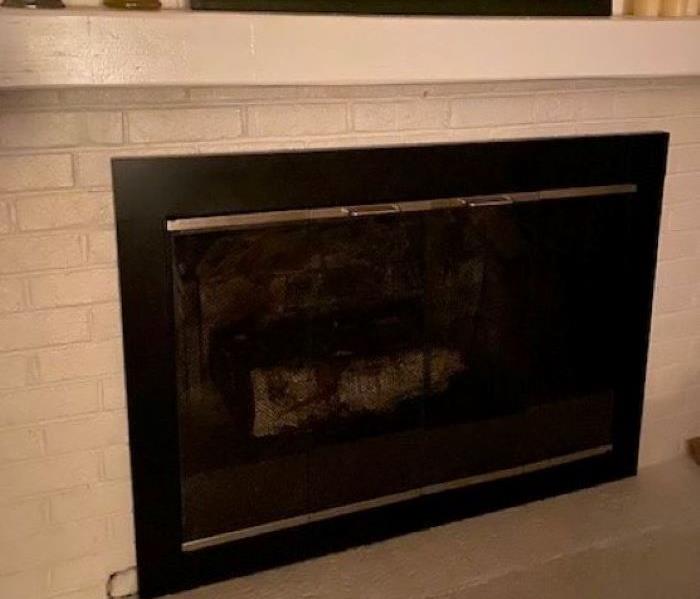 Fireplace Safety Tips
Fireplace Safety Tips
Brrr...it is cold outside! A warm cozy fire can be wonderful in the winter but it can easily turn into severe fire damage in your Charlotte, NC, home.
SERVPRO of South Mecklenburg county wants you to be both cozy and safe! We have some tips to share to keep you that way!
Get your fireplace cleaned and inspected yearly.
- Over time, a sticky flammable substance released by wood-burning called creosote can build up in the chimney.
- If a chimney isn't cleaned creosote can build up and the chimney can catch on fire.
- Chimney fires are both dangerous to the inhabitants and to the chimney.
- Leaves and animal nests can also build up in chimneys during the off-season.
- A level one inspection will ensure a sturdy chimney and necessary cleaning for both gas and wood-burning chimneys.
Only burn dry, seasoned wood
- For the best fire, your wood should contain about 20% water.
- Fresh-cut wood can contain up to 45% making it hard to catch fire, produces more smoke and creosote builds up faster.
- Properly seasoned firewood is cut and dried for six months to one year. It should have dark edges and visible cracks and be lightweight.
- Putting other materials like paper, cardboard or foam can cause extreme flames and toxic smoke posing a danger to people nearby.
Check the damper
- A damper is a plate or valve that controls the airflow in your chimney. This is what keeps wind and rain out when the fireplace isn't in use.
- Before starting a fire be sure to open the damper all the way to allow the fire to start and allow smoke to flow upwards.
- After the fire is strong the damper can be closed partially to keep heat in while letting smoke out.
Install carbon monoxide detectors
- Carbon monoxide is produced from burning wood and if this builds up indoors it can cause serious problems.
- Be sure to install a detector near the fireplace and in bedrooms to protect from carbon monoxide poisoning.
Be sure to follow all of these steps to enjoy relaxing by the fire safely. For more information on fire safety, the National Fire Protection Association is a good resource.
To see more fireplace safety tips in action check out this video.
Want to know more about us? Please check out our other pages:
LinkedIn Facebook Instagram Twitter Angie's List BBB
Three Ways SERVPRO of South Mecklenburg County Restores Items After a Fire
2/18/2021 (Permalink)
 White sofa restored to brilliant white after being covered in greasy soot!
White sofa restored to brilliant white after being covered in greasy soot!
You walk away from the stove for a moment, you leave a burning candle unattended, or you think the ashes from the fireplace are cool enough to throw away and in an instant, you have an emergency!
A fire in your Charlotte, NC, home or business may leave you worried about whether your property or contents can be restored. Fortunately, SERVPRO of South Mecklenburg County has multiple services and tips on how to restore items.
Here are three common methods our highly trained technicians apply to your contents to restore:
Washing
- The most common way to clean items after a fire is washing with special cleaners.
- Depending on the size of the item and whether they are mechanical or not we may use a rag to wipe the soot off, or we may soak the item.
- Even upholstery can be cleaned with our special cleaners for furniture.
- We also have a special chamber where we apply an ozone treatment to remove lingering odors.
- After we wash and dry all of your items they will be moved into storage until the restoration process is complete.
Dry-Cleaning
- Items that are sensitive to liquids like certain fabrics, mechanical items and electronics may be cleaned with powders rather than liquids.
- This method involves laying powder over the surface and wiped away.
- A fine scrub brush may also be used.
Freeze Drying
- Freeze drying is often part of the salvaging process for important documents that were damaged by water used to put out the fire.
- This process removes the water from paper without exposing it to further damage.
- The restoration service can also offer to make digital copies as well.
If your home or business experiences a fire emergency, be sure to call SERVPRO of South Mecklenburg County to make it "Like it never even happened."
Want to know more about us and read are awesome reviews, please check out our other pages!
LinkedIn Facebook Instagram Twitter Angie's List BBB
How To Get Soot Out of Clothes After In Charlotte NC
2/8/2021 (Permalink)
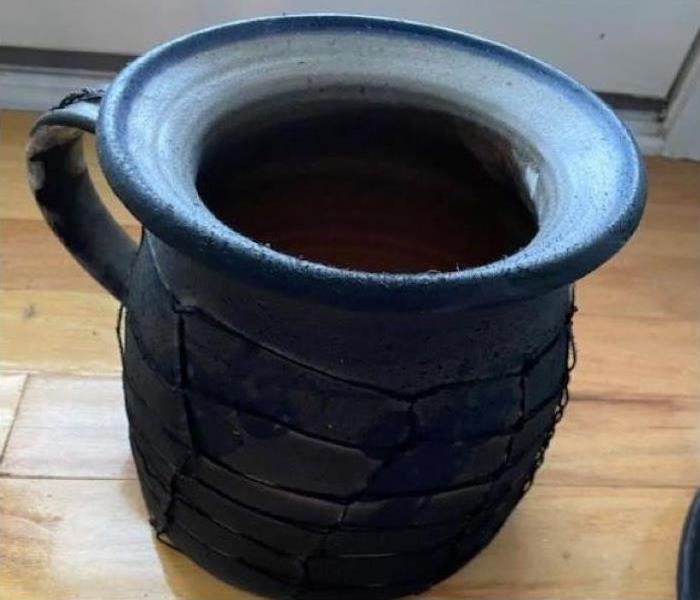 Fire Damage Cleaned Properly in Charlotte NC
Fire Damage Cleaned Properly in Charlotte NC
If you have a fire in your home, we recommend you calling SERVPRO of South Mecklenburg County first. We are highly trained and specialized in mitigating fire damage. Smoke and fire damage reside is not healthy to be around. We have the PPE and training to address these issues properly.
When you have a fire in your Charlotte, NC, home or business, smoke can very easily spread through the ventilation system and reach rooms that were not near the fire.
If your clothes have been stained by soot there is a solution.
- Call SERVPRO of South Mecklenburg County and let us clean them so that you can be sure they are clean and safe for wearing!
- If you want to try it yourself, you will need:
- Salt
- Formula 409
- Washing Soda
- Borax
- Ammonia
- Soapless Shampoo
Still dirty? Soot everywhere?
Steps to Remove the Soot:
- Cover any soot in salt and let sit for a few hours. Launder the clothing as you normally would.
- Soak the soot in Formula 409 and wash the clothing again.
- Add half a cup of borax or washing soda along with the regular detergent.
- Dilute ammonia to 10% with water. Dab the stain with a soapless shampoo and add several drops of ammonia to the stain. Use a brush to scrub the stain and rinse with water.
If any stain remains after taking these steps try dabbing the stain with alcohol. When working with ammonia never apply it to wool and make sure to wear gloves and keep the area well ventilated.
Source
LinkedIn Facebook Instagram Twitter Angie's List BBB
 Smoke alarms save lives! Make sure they’re in the right spots to fully protect your Charlotte, NC property. Check out our latest fire safety tips!
Smoke alarms save lives! Make sure they’re in the right spots to fully protect your Charlotte, NC property. Check out our latest fire safety tips!






 24/7 Emergency Service
24/7 Emergency Service







































